#I compared my work to caricature- and I certainly mean it!
Text
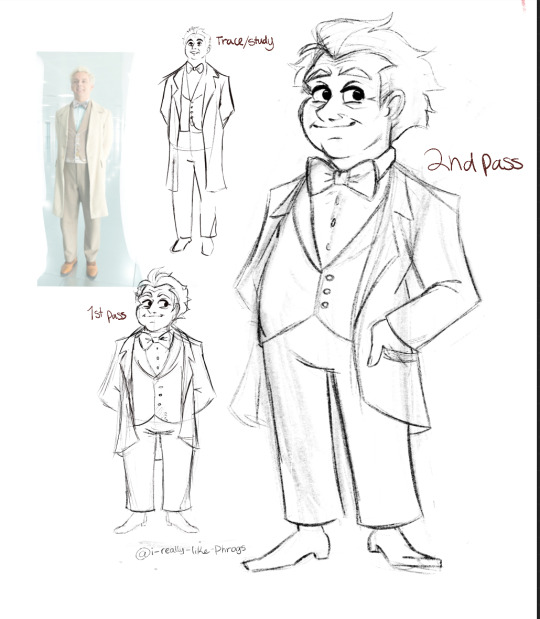
Working very hard to capture Aziraphale’s likeness! We’ve got a ways to go, but I think I will be very happy when I finish figuring out his structure. :)
#I compared my work to caricature- and I certainly mean it!#I care very deeply about little things that make a character who they are- especially when drawing real people#*Triumphant Exhale* WE CAN DO THIS!!!#my art#procreate#good omens#ineffable divorce#good omens season 2#good omens s2#aziraphale#My man Crowley deserves the best looking husband around! (Well-once he comes back from heaven)#Do it for Crowley!! … once I actually draw him.
22 notes
·
View notes
Note
so here's something I'm curious about: God's Not Dead. The films, not the statement itself.
I first saw the first film when I was younger and I hadn't yet embarked on my journey on examining just what i was taught and what I truly believed, but I remember finding the film a little uncomfortable.
I saw the second film and Ive never watched the third, and I think what I really don't like the first film is how it bashes other people's walks of life (Muslim father, three brands of athiests, and how it continues the myth that Christians in The United States are being Persecuted for their Faith Right Now.
Oh yeah and how the plots are really really dumb too, since the first film centers around a philosophy class with a professor that is skipping a very important part of most College degrees and the second takes place in a Bible Belt State with a high school teacher answering a students question comparing Marting Luther King Jr to Jesus's Sermon on the Mount and being taken to court over it.
I was twelve or so when I saw that movie and I honestly was not convinced by the film That God's Not Dead (in terms of the actual arguments in the class scenes.
The specific Denomination that I grew up with (Adventist) focuses a LOT™ on the end times so I do know about the future persecution thing well but like, I don't think we're there yet.
Anyway if you don't know those movies, feel free to ignore this ask but I'm genuinely curious about your thoughts on them, wether positive or negative or neutral
Hi! I saw the first God’s Not Dead in theaters. Never re-watched it. Did not see the sequels.
The good thing about God’s Not Dead is that people worked hard to make something that might shine a counter-cultural light on the truth that the God of the Bible exists. Stories that try to point to truth are on the right track, baseline.
The bad thing about God’s Not Dead is that it took things that are real, and genuine, and true…and it made them feel fake. By telling the story with strange conclusions and weird-triumph moments.
The thesis of the movie, that God is not dead, is something that only non-Christians would need to be convinced of. But the movie is clearly made for Christians. So. Yeah, it’s uncomfortable.
But you shouldn’t find every experience that the movie tries to portray uncomfortable because they don’t happen. You should find it uncomfortable because they don’t happen in that cheesy, Hallmark-grade way.
When a student stands up to their professor and says, “no, I’m not going to go along with this, and this is super weird that you’re trying to draw this line about the specific Christian God,” guess what? The whole classroom doesn’t usually get up and agree with you. They normally barely react. So even though some professors do put their foot down and try to mock or “kill” God in the classroom, and some students do push back, no. It doesn’t normally happen in that victorious way.
Just like how some young Muslim converts to Christianity genuinely are treated poorly by their families, or their community, not just in America, but absolutely, certainly around the world. Absolutely, certainly. I literally can think of not one, but two examples I’ve recently heard of, directly, from people I know.
Like I said, the events and life-experiences that the first God’s Not Dead movie are based on do technically happen all the time in America, and the West, and the world in general. They just don’t normally come with crowd-agreement, impactful music, wise one-liners, and celebrity appearances. The worst thing that the God’s Not Dead movie does is show you hints of things that are real, and really happen in real life, but cheeseball way it shows you those things, and the caricatures it turns people into, makes the real thing look fake.
As far as “the myth that Christians are Persecuted Right Now in America” goes…you just have to decide what you mean by “persecuted.”
If you mean, are we getting our heads run over by cement mixers, or dragged out of our homes and imprisoned for studying or even owning a Bible, or kidnapped by hired hitmen once our families find out we’re Christians, like they are in Yemen or Africa or basically anywhere outside the West…no. No, we’re not facing persecution like that. We’re not persecuted.
But if you mean, in the context of this conversation, that “atheists and professors and people in the professional sector of our education systems don’t have a weirdly specific bone to pick with Christians,”then you’re wrong. They do. They have. For a long time.
My second semester in college, in my plain old World History class, the Professor legitimately opened his class by explaining to us students that if we wanted, he would allow us to replace our midterm and our final exams with book reports as long as we read two specific books he assigned us. One was a book about how Jesus of Nazareth was not the Messiah and the Bible was false. The other book was a fictional short novel with heavy themes criticizing specifically Christian religion. Those were the two books he picked for his students to skip taking the midterm and the final, if only they would read those two books. And those were the ones he chose.
Not only that, but literally in the first class, I remember being stunned when he flippantly opened his summary of the 18th century by saying, “If anyone ever tells you you should check out the God of the Bible, and follow him, laugh in their face. Don’t do it. He is the kind of God who likes to make His people promises and then strand them in the desert for forty years!” First class. Out the gate. Like it was a joke.
It’s not a joke. Dude just openly mocked two out of the three major world religions that people identify with across the globe. Explain to me how telling someone never to convert to a specific religion and to mock it instead is anything other than “discrimination?”
Can you imagine a Professor getting up in front of a class and saying, “if anyone ever tells you that you should check out Allah ] and follow him, convert to Islam, laugh in their face! And here’s one short novel and one historically inaccurate essay criticizing Allah and making fun of Islam; if you’ll read these, tell you what, I’ll let you skip the two most stressful exams of the semester!”
No, of course you can’t imagine that. A Professor who did that about any other religion, creed, or god would be fired or taken to court or penalized or dragged on social media, at least.
But the only student in the whole room who batted an eye when he said that about the Christian God was me. The only one who said anything was me. And it wasn’t a big stand up, dramatic declaration. Momentous music didn’t play in the background. My friends and classmates didn’t’] gasp or support me or stand up and agree with me.
It was just me raising my hand and saying in a shaky voice with a red face, after the sixth time he’d randomly deviated from talking about the Roman plumbing system to describe how the Apostle Paul and the other Apostles supposedly disagreed about who Jesus was (big lie, not true at all, but often used to “discredit” the Bible) to say, “sir, that’s not true. It doesn’t make sense. There’s a verse in the Bible where the Apostle Peter literally tells the church that the Apostle Paul’s words are directly from God.” And then he was like, “okay, I’m going to move on.”
I mean I just felt kind of stupid because the whole class was confused about the interaction; nobody was treating it like it was as important as me or the professor was, so it felt awkward to “make a stand.” But rest assured, all over the freakin’ country, people are excited to use up way too much of their brain power and emotional energy mocking, disparaging, and trying to discredit the God of the Bible and Christianity. They don’t believe in Him, but they’re so he’ll-bent on making sure nobody else does either?? Like, I don’t believe in Big Foot, but I’m not walking around trying to barter my students into reading anti-Big Foot books by giving them a pass on their midterms. But that’s how lots and lots of “athiests” treat the specific Christian God.
That’s not new. It’s not dramatic. It’s not persecution. It’s alllll part of the same old song and dance.
But it is real. The worst thing about God’s Not Dead is it made it feel fake and caricature, when it happens all the time and matters 🤷♀️ Anyway. Hope that answered your question.
#God’s not dead#cheesy Christian movies#cheesy#movies#Christianity#me#sorry about the personal anecdote#critical thinking
79 notes
·
View notes
Text
cultural appropriation in ATLA (hinduism edition)
i’m sure there’s already a ton of posts about this, but whatever, i’m still making one idc.
ATLA’s cultural appropriation, everyone knows about it, the white people don’t speak about it, and the asian and indigenous people get ignored. we know the cycle. but i wanted to come here and highlight some of the most prominent examples of ATLA abusing hinduism, as i am kinda sorta hindu (i was raised in a hindu household, i go to chinmaya mission, that kinda shit). i might forget some things so keep that in mind.
this is gonna be divided into 3 main sections, since there are different ways that they disrespect hinduism that i don’t wanna lump together.
and i’d say i know a lot about hinduism but that doesn’t make me an expert, obviously, so if other hindus have anything to add and/or correct then please do !! and if anyone else wants to share how their cultures were appropriated then please do that as well !!
so let’s get started shall we?
appropriating hinduism
1) the avatar
we’ll start with the most obvious example: the avatar itself
i know that there are parts of the avatar mythos that are taken from other cultures as well but the idea of the avatar itself is primarily from hinduism.
basically in hinduism, the term dashavatara refers to the 10 reincarnations of lord vishnu (the god of preservation), with avatar(a) meaning form or incarnation in sanskrit, and das(a) meaning ten. it was said that whenever the world was out of balance, lord vishnu would come down to earth in a certain form to restore balance. Each reincarnation is considered a different life with a different story. the avatars of lord vishnu are often considered the saviors of the world.
so basically, the central idea of the show and the actual name of the show is largely based on hinduism.
2) chakras
many different indian religions have a concept of chakras (chakra meaning wheel or circle in sanskrit), but hinduism is the one that primarily preaches the system of seven chakras, the version used in ATLA.
chakras connect the physical body to the ‘subtle’ body (referring more to the spirit and the psyche) by connecting parts of the body to aspects of the mind. the idea is that through different forms of steady meditation you can manipulate the different chakras and allow the pure flow of energy through the body.
the whole idea of chakras on ATLA is that aang has to unblock them all to let the cosmic energy flow through him so that he can go into the avatar state at will. so yeah, pretty much that whole idea was taken from hinduism.
3) terminologies
these are just a few terms that were taken from hinduism. i’m pretty sure there are more that i can’t think of right now but yeah.
“agni” kai
i’ll be honest i don’t know where the ‘kai’ part is from, i don’t think it’s from hinduism but if it is well fuck me i guess.
‘agni’ in hinduism is the god of fire, so the creators used it in ‘agni kai’, the name for a firebending duel.
“bumi”
this is in reference to the hindu word for ‘earth’, which is bhoomi. this is also in reference to our goddess of earth, bhoomi devi. also this doesn’t really bother me but i wonder if the creators knew that bhoomi is a name typically used for women (as are most hindi names ending in ‘i’/‘ee’).
in general, concepts like having multiple complex gods (the spirits) who are capable of good and evil and the reincarnation cycle are prominent in a lot of asian cultures, including (and arguably primarily) hinduism.
mocking hinduism
now we get into the mockery of hinduism in ATLA, because it is very much there.
1) whoever the fuck that baboon guy in the spirit world was
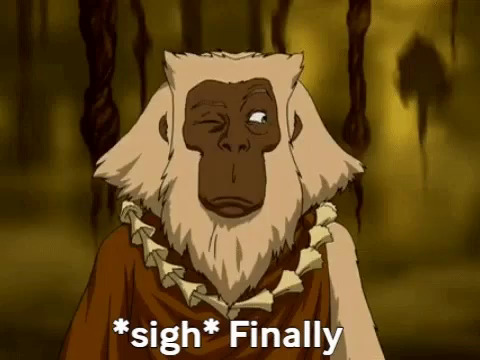
now what the fuck was this.
i mean i wouldn’t say this is the most egregious example of them making fun of brown people but lord why did this even need to be there? this random guy from the spirit world has an indian accent ? and is fervently chanting ‘om’ for some reason, and it’s clearly meant to be seen as comical. also portraying brown people as monkeys....... really.
2) combustion man/sparky sparky boom man
when rewatching ATLA in 2019 i actually had no idea that this was a thing, because the last time i had watched it was as a kid and i didn’t finish it.
so lord was i in for a surprise when i saw...

now... now what.
if you didn’t know, combustion man’s ‘third eye’ is designed to replicate the hindu god of destruction, lord shiva. right down to the vibhuti on his forehead (referring to the three line markings around the third eye).
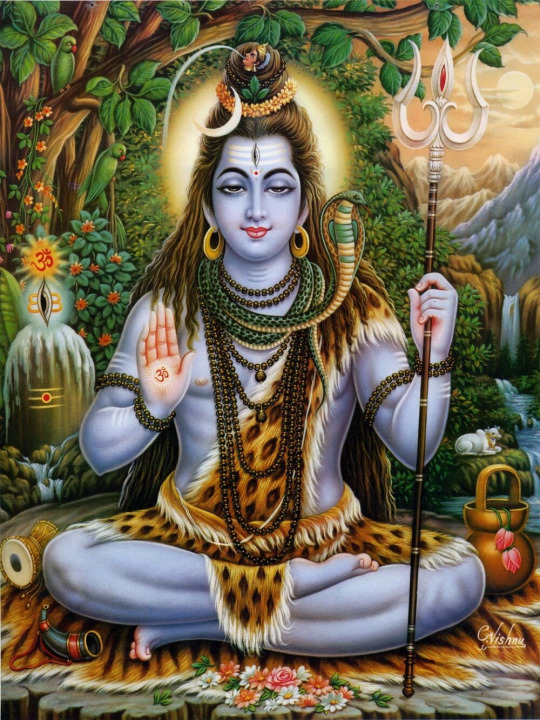
in hinduism, lord shiva’s third eye is used to reduce people to ashes, though as far as i can recall, not very frequently. the primary significance of the third eye is that it represents the ability of higher spiritual thought and higher consciousness.
the ATLA writers take the ACTUAL significance of the third eye, throw it out the window, and then take its destructive abilities to make a super duper cool and dangerous new firebending technique.
and if that wasn’t bad enough, the actual person who uses this technique, and is meant to emulate a GOD who is PRAISED, is a scary, burly, half metal man who is a villain and an assassin. not to mention the design of his facial hair replicates that super duper scary “terrorist” depiction of brown people, particularly of muslims, that white people are so thoroughly terrified of for no reason.
this is a parody of a god, and they portrayed him as this terrifying, maniacal fucking assassin who, along with p’li, the combustion bender from LOK, is constantly referred to as a “third-eyed freak”. i’ve made this analogy before and i’ll do it again, this is like making jesus into a hitman.
now onto my favorite example...
3) guru pathik
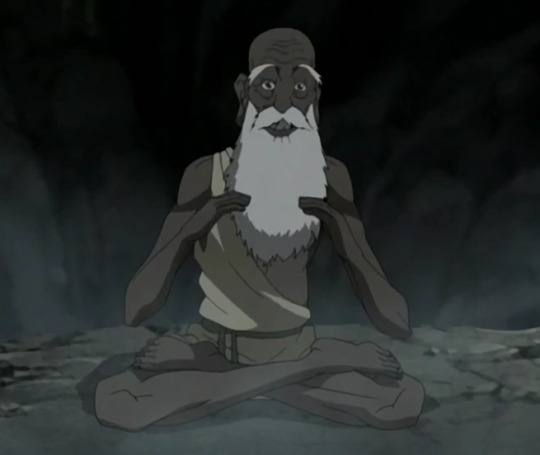
ah, this motherfucker.
i don’t really have any problems with him as a character, i mean hell, must’ve taken a fuck ton of patience to handle aang’s “why would choose cosmic energy over katara” bullshit.
but we all know it, we see it plain as day, don’t even try to deny it.
“guru” literally just means teacher or guide, so i don’t really know why pathik needed to be referred to as “guru” so distinctively from aang’s other teachers and guides, but that’s just extremely trivial compared to all the other issues with this character.
first of all what is this character design? what is he even wearing? if they’re trying to replicate the clothes of swamis and priests and stuff this is already wrong, realized people don’t dress like this. and why the fuck does he have an indian accent? and why was this indian accent done by a non indian (brian george)?
once again, the poor but extremely heavy indian accent is clearly meant to be mocking, if it wasn’t, they wouldn’t’ve gone out of their way to get a non indian person to DO an indian accent, and instead they would’ve just gotten an actual indian person to play the role.
and oh yeah, the onion and banana juice. because hindus just eat weird shit right.
whether it’s actually weird or not, the show certainly portrays it as weird. and as far as i know no hindu actually fucking drinks onion and banana juice.
ironic because brown people can absolutely destroy white people in cooking. but i digress.
i know what you’re all waiting for. because the guru apparently didn’t have enough fun with guru pathik, so they just had to come back to him in book 3:

where do i begin.
so this is obviously john o’bryan’s super funny and hilarious depiction of pathik as a hindu god.
usually when a god has multiple arms it’s to carry an array of things, from flowers to weapons to instruments, and one hand is typically free to bless devotees (ie. goddess durga and lord vishnu respectively):

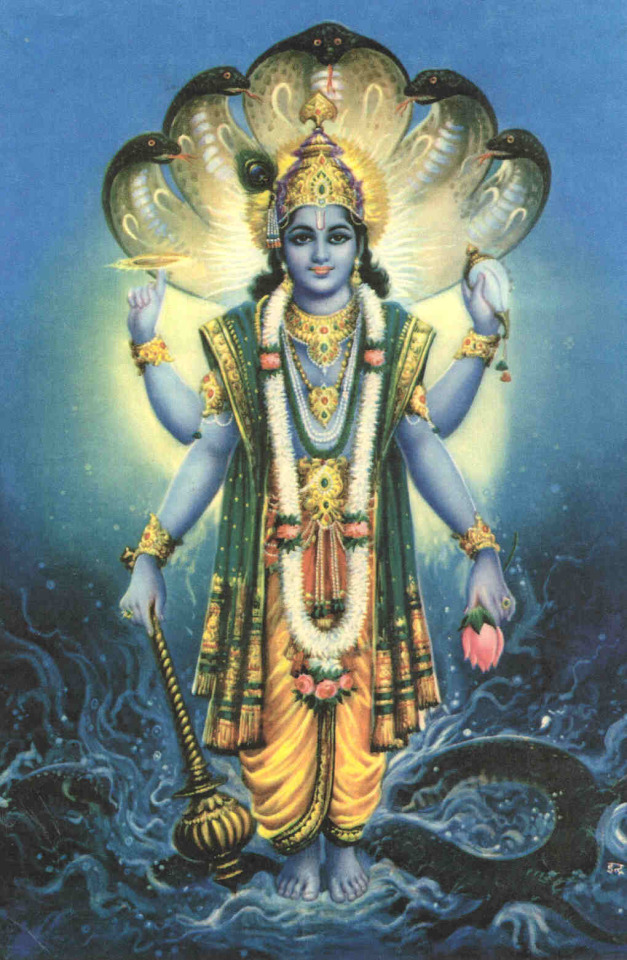
but of course white people see this as weird and so they make fun of it, hence guru pathik having multiple arms just flailing about aimlessly (save for the two that are being used to carry the aforementioned onion and banana juice).
then there’s the whole light behind pathik’s head which is usually depicted in drawings of hindu gods to show that they are celestial.
also what the fuck is he holding? is that supposed to be a veena? because this is what a veena looks like:

and i assume the reason this was added was to mock the design of goddess saraswathi, who carries a veena:
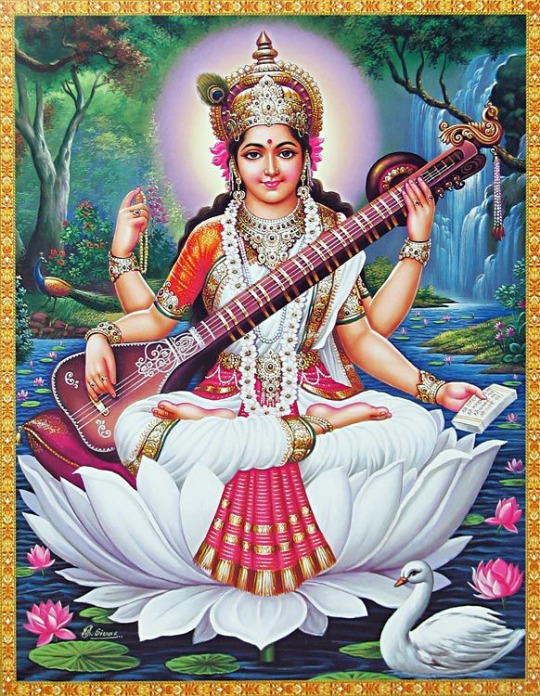
but that right there in the picture of pathik looks more like a tambura than a veena.

and it also just kinda looks like a banjo?
but i guess the animators just searched up “long indian instrument” and slapped it on there. actually no, that’s giving them too much credit, they probably didn’t search it up at all.
and then the actual scene is pathik singing crazily about chakras tasting good or something while playing the non-veena and it’s all supposed to be some funky crazy hallucination that aang is having due to sleep deprivation. just some crazy dream, just as crazy as talking appa and momo sparring with swords or tree-ozai coming to life.
our gurus and swamis and sadhus and generally realized people are very respected in hinduism, they’re people we look up to and honor very much. and our GODS are beings that we literally worship. and the writers just take both and make caricatures out of them for other white people to laugh at.
4) other shit
before we move to the next portion i just wanna mention there are also smaller backhanded jabs that i can’t really remember now, but one example was when zuko was all “we’ll be sure to remember that, guru goody goody”. or when a character would meditate and say “om” only when the meditation is supposed to be portrayed as comical or pointless. or in bitter work when sokka was rambling on about karma. small things like that. but moving on.
south asian representation, or lack thereof
now i finally get to the “losing” hinduism part. by this i mean the lack of actual representation there is of south asians (the region where hinduism is primarily practiced) despite the fact that hinduism plays such a big role in the show’s world design.
i think it’s safe to say that broadly the main cast consists of aang, katara, sokka, zuko, toph, azula, iroh, mai, ty lee, and suki.
a grand total of none of these characters are south asian. the writers don’t even attempt to add any south asian main characters.
there are characters with dark skin, like haru and jet, but a) they’re not confirmed to be south asian and don’t have any south asian features or south asian names, b) they’re side characters, so they don’t count as representation, and c) even if they were south asian and main characters, jet wouldn’t even count because he’s portrayed as a terrorist.
the ONLY truly south asian character we get is fucking guru pathik. so yeah. not representation.
i don’t get how the creators of this show rip off of hinduism (among many other south asian cultures they rip off of), mock indians, and then don’t even have the decency to HAVE a main character who is south asian.
i’ve never gotten a chance to compile all this, and this definitely isn’t all the creators have done, but i hope this was somewhat informative.
1K notes
·
View notes
Note
I saw the ask about having the person feeling like that the Loki show is objectively bad. I liked the show, here is why.
I love Loki, and I love the MCU, but I don’t go into any of it expecting consistency. Tony and Loki are my favourite.
Tony goes through character development in his own movies, IM3 especially that main canon just kinda ignores. So I didn’t go into work he Loki show expecting them to get him consistent or right. I just went in prepared to enjoy the show for what it is in isolation. I also know that no one looks at the stories they write for the MCU critically, so I try and turn off that for a first time watch.
I really like the show, that doesn’t mean I think they made it consistent or in character for Loki. I get why people don’t like it.
I really like the TVA and all the concepts it introduced. I really liked seeing Tom acting his heart out. And I really like Loki/Sylvie because I find something very compelling about a character who hates themselves, meeting another version of themselves and being able to love them. It is not a ship I’m going to write fic about but I like them within the show.
Basically what I am saying is that I go into MCU media with the expectation they will mess up at least one character or plot point badly every time. I like the media for what it is, and I appreciate whatever it brings to the table that I can then cannibalise into da works.
Yeah that's fair. Everyone has a right to their own opinion. Fandom is better when there are a diversity of opinions and we can all respect each other and engage in open and good faith discussion rather than attacking people for having the "wrong" views or trying to harass them out of fandom.
For me personally I feel like the show fails on 3 fronts.
1) To me it fails as a Loki show. I really enjoy Loki as a character and I wanted a show about him. And I didn't personally see him in the show at all. I saw a completely different character who does not behave, speak, act, respond, react, stand, emote, or make choices like Loki does. He doesn't even LOOK like Loki because they did his hair and makeup wrong. And that's really what I wanted. I didn't want Larry (as I call the show character). I wanted Loki. That was what was advertised and to me he was so ooc that he was unrecognizable. If I just saw a clip out of context and didn't know what it was from I would have assumed I was seeing Tom in a totally different role.
Thor Ragnarok felt like a different take on Loki that definitely retconned some of his personality and history, but still felt like an alternate interpretation of the same character in the sense that I could recognize the character as Loki (albeit a different version of him); some people liked that, other didn't. But here it wasn't that. It just felt like a completely new (and to me far less interesting and compelling) character. And beyond that it felt like the show went out of its way to make a mockery of the character played by Tom and by extension anyone who ever cared about Loki's character. Like it felt like a mean spirited caricatured parody. Loki is also extremely sidelined in what is supposed to be his own show. And it most certainly didn't feel like a show about Loki, which is what I wanted. So for me the show didn't provide what I was looking for.
2) To me it also fails on its own merits. If I view it in isolation without comparing it to previous canon and just view it as its own thing it also fails. The quality of the dialogue felt very poor. None of the humor made me laugh and it all felt very juvenile and forced. The plotting and characterization seemed nonsensical and all over the place. Like Sylvie sets off those charges and the episode ends on a cliffhanger with that but then it's never addressed later.
The reason that Loki and Syvie allegedly falling in love breaks the timeline didn't really make sense. Sylvie is going around murdering timekeepers and yet Mobius somehow immediately like and trusts her and says he prefers her to Loki. Loki and Sylvie are simultaneously presented as the same person and also totally different people. Loki allegedly learns self love but we never see that - we see him call himself degrading things like pathetic. And we see him think that Sylvie is better than him. That doesn't seem like self love. The romance feels extremely rushed and unrealistic and awkward and we aren't given a compelling reason for why they are in love or what they even have in common. Sylvie doesn't really have much of a character. Mobius and Loki don't interact much and Mobius consistently mistreats him but Loki somehow thinks of him as a friend. Mobius is portrayed as a good guy for cheerfully carrying out the TVA's ends but Kang is a villain for creating the TVA. The TVA seems to be all made up of humans even though it's in charge of all reality.
If Loki did bad things, then the TVA did worse things and thus are not moral authorities. If the TVA’s actions are acceptable then so are Loki’s. If Loki was wrong to violently impose his will on a planet (let’s forget about the context with Thanos for a minute) then the TVA is wrong to violently impose its will on all of reality in order to eliminate free will. If Loki was wrong to kill a few people, then the TVA was certainly wrong to kill trillions. And thus neither Mobius nor the TVA are moral authorities when it comes to Loki because they are infinitely worse. If the actions that Mobius and the TVA took are acceptable, then there is no reason to criticize Loki because he did far less than them. Etc etc etc.
The cinematography is also very poor and unprofessional and the costumes look extremely cheap and unprofessional. The whole story feels confused and disjointed. The directing is bad because the actors are all very capable but the performances often feel wooden and forced and fake. And the pacing is terrible. A lot of it drags and then plot twists come out of nowhere with no setup so it just makes them feel jarring rather than earned or entertaining.
3) To me it also fails on a moral front. The show contains a lot of problematic depictions and messages and promotes messages that are offensive or even downright harmful.
Mobius gleefully subjects Loki to physical torture by leaving him to be repeatedly beaten in the genital area. This is a very clearcut and straight forward example of physical torture. And Mobius feels no compassion for Loki or remorse over what he has done to him. If anything he seems to find it amusing. And certainly the audience is supposed to find it amusing (which is gross and harmful messaging on Disney’s part). He also subjects Loki to psychological torture. This is a fact. There are multiple instances in the show where the TVA and Mobius subject Loki to treatment that would meet the legal definition of torture under both US law and international law. Furthermore, Mobius and the TVA are holding Loki against his will and forcing him to labor without compensation or any hope of release because they view him as belonging to a group of people (Variants) that they view as inferior and not really people. That’s a pretty textbook case of slavery. So objectively Mobius is Loki’s jailer, torturer, captor, and enslaver. And yet Mobius is presented as justified in what he does to Loki. The writer and director have even called it therapy. And a result many people have parroted this which is very harmful.
The queer “representation” feels straight out of bigoted propaganda. Loki’s personality traits have been retconned to map onto harmful stereotypes about queer men. He is overly expressive, makes grand gestures, is flamboyant, cowardly, dishonest, weak, bad at fighting, lazy, spineless, meek, unused to exercise etc. Now a person could be all these things and also happen to be queer. However, Loki was never like this before. His character was retconned to be this way only in this series where he is confirmed to be queer.
Furthermore, the entire premise of the series seems to be that it is funny and entertaining and justified when Loki is dehumanized, mocked, humiliated, hurt, tortured, beaten, assaulted, and/or robbed of his dignity. That’s the premise. That’s the whole show.
In addition to pro torture and pro authoritarianism and pro victim blaming messaging the show also has problematic depictions of black characters (see here and here), Asian people (see here) and also has a lot of fludphobia and transphobia issues. And much more.
@nikkoliferous has put together a great compendium here of various posts explaining the various issues with the show if you're curious about why some people disliked it.
79 notes
·
View notes
Text
Blooming Brilliant, an Aroace Willow Park Manifesto

[id: a gif of a heart locket opening. One half of the locket displays a picture of Willow Park from The Owl House, winking and making peace signs with her fingers. Blue and yellow stars surround her. The other half reads "willow park my beloved." /end id.]
Greetings! It’s me, User Aroclawthornes, and instead of working on all the time-sensitive homework I have I sat down and wrote an essay explaining why I think Willow Park OwlHouse could plausibly be read as aroace, and why it would be a thematically enriching interpretation. I’ve never written anything like this before, so it’s oddly formal, a little pretentious, and contains a lot of qualifying language, but I'm confident that it gets my point across. I’m not intending to speak over other interpretations of Willow or assert that it's the only true way to read her, but it's a headcanon I find interesting, and I think there’s a lot of evidence to back it up, between certain elements that Willow’s arc employs to some good old overanalysed symbolism. If you're aspec, I hope this is validating; if you're not, I hope it's interesting; if you don't care, scrolling past it is quick, free, and easy.
Some disclaimers on terminology: I’m speaking from an aroace perspective, and so when I say “aspec coding” I’m generally referring to both orientations as a catch-all - a lot of the coding surrounding Willow could go either way. I’m also going to be talking about commonly accepted “aspec” narratives, but I’m aware of the limitations of this insofar as my experiences are only a single facet of the diverse range of aspec people in this world, so anyone who wants to add or argue anything - respectfully - is encouraged to.
Analysis below the cut!
The Thing About Plants
I’m not going to pretend that an association with plants is historically indicative of aspec coding, because, frankly, there haven’t been enough aspec characters to establish it as a convention, and it’s also a fairly wide-reaching branch of symbolism. However, I am going to propose that lighthearted comparisons between asexual people and plants (however misguided on functions of plant reproduction they are) are fairly common elements of budding ace teenage humour, as are related quips about photosynthesis.
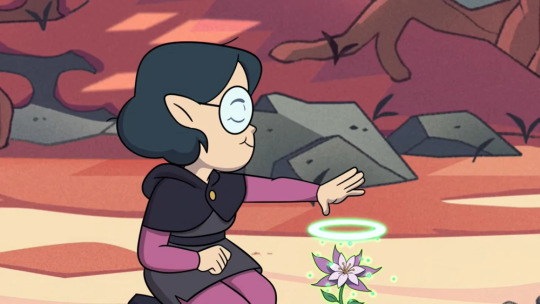
[id: a screenshot of Willow from "I Was A Teenage Abomination", depicting her sitting on the ground while casting a spell over a small, pink flower. /end id.]
I’m also not going to claim that the colour green Belongs To Aromantics, and therefore that All Plants Are Belong To Us, but in tandem with everything else I’m about to cover, the connection between Willow and plants seems like a fairly plausible nudge to a relatively common element of aspec humour.
“Half-a-witch” Willow and the Late Bloomer Experience
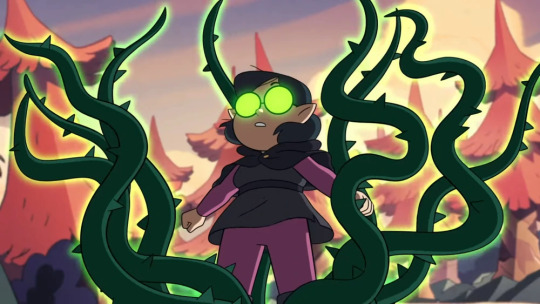
[id: a screenshot of Willow with glowing green eyes, from "I Was A Teenage Abomination", depicting her summoning a mess of thorned vines. /end id]
Willow is literally nicknamed “half-a-witch”, in reference to her supposedly incomplete state - this is a sentiment eerily reminiscent of the pressure to find one’s “other half”, which affects aspec - especially aromantic - people particularly profoundly. She’s considered a late bloomer, someone who hasn’t reached the societal milestones of growth at the expected age, and who is derided and considered immature as a result of this perceived failure. However, we quickly discover that Willow is, in fact, an exceptionally competent and powerful witch - taken out of the restricting frame of the Abominations track, she’s able to grow into her own, “complete” person, therefore proving that she was never really lacking in anything in the first place. Like real-life aroace people, she was perceived as limited and immature based on the expectations and judgements of other people, but Willow was never deficient in anything, least of all herself.
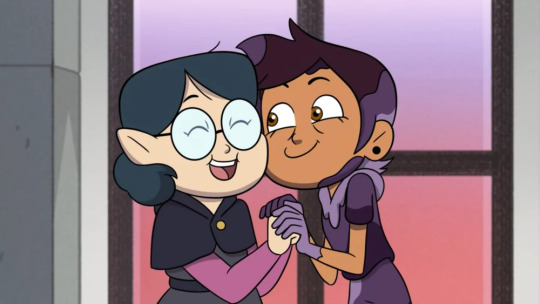
[id: a screenshot of Willow and Luz from "I Was A Teenage Abomination". They are holding hands - the former is laughing with her eyes closed, and the latter is grinning, while covered in abomination goop. /end id]
As far as symbolism goes...the track Willow is initially put in literally requires her to conjure up another humanoid entity, with the expectation that she will therefore prove herself to be a whole and mature person. Only with this ability, she’s told, will she be successful and happy as an adult. The shapelessness of her attempts at conjuring an abomination reinforces this connection in my mind - if I may reference this quote from Ducktales 2017‘s (absolutely stellar) A Nightmare On Killmotor Hill, in which the protagonists explore their own subconscious fears via. the dream realm, for a second:
“I think that’s supposed to be my romantic interest, but I’m too threatened by the concept, so it never takes shape.”
A lot of young aroace people find themselves in situations where they attempt to convince themself of their interest in someone in an attempt to be “normal,” or end up lying in response to family members or friends’ questions about crushes. While Willow’s abominations, first and foremost, represent the expectations from her school, classmates, and family to be a successful, “complete” witch with a profitable future, I think that with an aroace interpretation of Willow they could also very easily be read as representing some latent insecurities over a lack of attraction, or pressure to find a significant other.
(I’m not condemning Willow’s dads, by the way - they seem like perfectly lovely fellas, and I’m confident that they were doing what they thought was best for her. They’re certainly very quick to drop everything to assure her future in Escaping Expulsion, so obviously they care about their daughter very much.)
Greens, Blues, and Yellows: Colour-Coding Willow Park
A while back, I made this post comparing Willow’s palette to the aromantic and aroace flags:
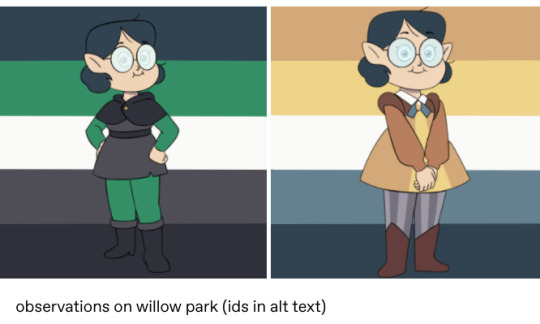
[id: a screenshot of a post depicting the aromantic and aromantic asexual flags, colour-picked from images of Willow in her Hexside uniform and casual dress respectively - these are overlaid on top of the flags. The caption reads "observations on willow park". /end id.]
The grey-and-green aromantic flag has long been the accepted mainstream symbol of aromanticism, and, as the above post - and many others - demonstrate, Willow’s palette reflects it near-perfectly. This could easily be a coincidence, owing to the palette of the standard Hexside Plant Track uniform, as well as her hair and eye colours - which are obviously supposed to be reflective of her plant-related abilities. However, given how fond of employing hidden meanings The Owl House has shown itself to be, I don’t think it’s far-fetched to claim that there’s at least a chance that her palette was constructed with the flag in mind.
The latter is...a bit more problematic for me, although it’s fun to joke about. The blue-and-yellow aroace flag was only created in December 2018, relatively late into The Owl House’s initial production, and it’s still relatively obscure, although on the rise in popularity as the accepted aroace flag (I only recently started using it myself), so I don’t know if Willow’s casual wear is enough to verify the presence of any deliberate subtext. I think it’s a fun coincidence, however, and (as was pointed out in this post) it’s cool that these blue and yellow stars surrounding Willow occur in the same frame as Luz’s bisexual decor:
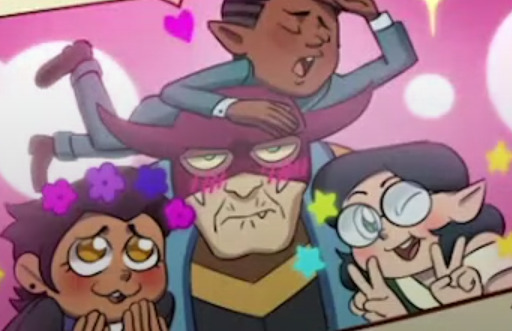
[id: a photograph of Luz, Gus, and Willow, all surrounding a disgruntled-looking Principal Bump. Luz has flowers in the colours of the bisexual flag decorating her hair, while Willow is surrounded by bright blue and yellow stars. /end id.]
also seen above: powerful bi/aspec solidarity
Conclusion:
Do I genuinely believe that Willow is being deliberately written this way? If you’d asked me, say, two months ago, I’d have said probably not - as far as queer representation in kids’ cartoons has come, it has a ways to go, and focusing on transgender characters seems like a more obvious (and equally invaluable) route to go down. I can name maybe five explicitly aspec characters off the top of my head, two of whom have been written as alloromantic and/or sexual in adaptations or continuations of the source material (I have...some grievances with 2005 Doctor Who). But the emergence of Raine, an explicitly nonbinary character on Disney Channel, has given me a little spark of hope, and so, even if it’s never confirmed, it’s comforting to be able to see a character with such strong elements of aspec coding and think to myself, just maybe, that there might be some intent behind it.
I also...really want to see interesting things done with Willow. We’re halfway through Season 2, and despite some promising setup for her arc in the Season 1 finale, she’s sort of been left by the wayside lately in favour of developing the more “plot-relevant” characters, such as Luz, Amity, Eda, and Hunter. Frankly, I think it’s a disservice to her Season 1 development, despite how much I adore all the characters I just listed - beyond any personal motivation, the prospect that Willow could be aroace adds a lot of sorely-sought depth to her, and, as detailed, a lot of this has already been set up in her earlier episodes. I just...I think it’d be neat. Rarely do you get a kids’ show so brazenly queer in its themes as Owl House, and aspec people deserve to be included in that.
Willow would also be great aroace representation because, well - those five or so aspec characters I mentioned being aware of are all white or “raceless” (...also written as white, basically), and so an aspec Asian character would be a really lovely step forward in this area. Additionally, all the characters I referred to are also conventionally skinny, and Willow is not only fat, but written in a way that doesn’t treat this feature as a caricature. People who are more knowledgeable on these topics than I are absolutely free to make additions, as is anyone who feels like I’ve left certain details out.
tl;dr: Willow’s association with plants could be read as a cool nod to aspec humour, her “late bloomer” narrative is eerily reminiscent of some common aspec experiences, her palette speaks for itself, and it’d be really cool if we could diversify the so-far fairly bland sphere of aspec representation.
I’m going to conclude this by linking Rose by The Oh Hellos, because they’re my favourite band, they share The Owl House’s initials, and I also think it’s a good Willow song. Peace out.
youtube
#the owl house#willow park#pspspspsps you will read my 1.5k word aroace willow essay#hooting#meta#willow#aroace willow manifesto#fuck it. this is getting posted
35 notes
·
View notes
Text
Hey listen
Knowing the history and origins of the word "femboy" as a slur used to describe trans women in the same vein that "she-male" and other shit is used. It was CREATED by cis people to fetishize trans women and compare them to men. It is not only transphobic but transmisogynistic. This is known by most 'older' people in the community.
With that said? I fucking cannot stand to see the way it's EVERYWHERE now, most often being adopted by young trans men who-and I know this sounds callous but it holds some truth- are so desperate for the validation of being called "boy" while still being effeminate and cute (because yes, misogyny and transphobia about anything feminine in the transmasc community also exists), without knowing the history of the word or WORSE thinking that they're somehow "reclaiming it". It's weird, it's still LARGELY used in a fetishistic way, and it's being used to reduce trans men to this stupid babified caricature that's honestly unsettling to observe!
I want to emphasize this because Ive been seeing a lot of other TME people hemming and hawing and going "Well just because it CAN be used as a slur doesn't mean it IS one" and... sorry! But that's not how that works, at all! If we want our support to be intersectional, we have to recognize that.
Here's the part that's not just my opinion though: Trans men and boys are TME. Trans-misogyny exempt. If you don't experience transmisogyny, you cannot "reclaim" transmisogynistic slurs. You can't. That's not how it works. If a trans woman wants to reclaim it? Sure! I don't honestly see why anyone would, but I'm not a trans woman.
And yeah, some trans women feel differently about it. My ex gf called herself a trap. She thought it was funny and she'd probably think the same thing about this word. I know a few trans women who are closeted IRL and use this word to refer to themselves in online spaces.
The thing is, these few people don't really represent the whole community, and me as a man tokenizing those trans women in my life who are Whatever About It in order to justify using it myself somehow? Would still be wrong and fucking gross. Because not EVERY trans woman feels that way about it, they're certainly not the majority.
Tl;Dr? Read it anyway lmao. Not everyone wants to be called a fucking slur. Not everyone feels the same way about the word. AND I dont caaaare what you read in your neo-liberal sex-positive reddit server; it should not be used to describe trans men, NO not even GNC genderfluid demiboy trans men. You cannot claim solidarity with trans women in good faith and then call yourself a transmisogynistic slur. You cannot tokenize the trans women in your life to justify using a transmisogynistic slur for yourself or others. You cannot reclaim a transmisogynistic slur if you are TME.
And if you're cis and you're using this word? Take a long look at yourself and ask yourself why it's so important to you that you use a literal fetishistic slur. It's not only transphobic in general, transmisogynistic specifically, but it's just fucking gross, man. Be better.
469 notes
·
View notes
Note
The line about tantric meditation in the last chapter made me wonder - what actually is the each of characters level of sexual education/experience? CQL canon naturally only provides very little on that topic..
Warning, this got kind of long.
I have consciously kept my thoughts on these topics rather vague within the story itself, because – as you say – there is very little said in canon about it, and it's one of those topics where people tend to have vastly differing ideas and tastes.
But I can muse a bit about my headcanons in Roadtrip-verse!
Starting with Xue Yang, who is the only character whose sexual activities are mentioned at all in canon:

Of course that could be sheer bravado, but as we know, Xue Yang ”doesn't like to exaggerate when he speaks”, so...
Xue Yang fucks. Pretty much anything and anyone he wants. I hc him as pretty much pan with a gay preference – sex is like candy to him, different sorts of people just variations in flavour. One of those pleasant things you go get when you get cravings. If the other people involved are happy participants, that's nice. If not, it's often even nicer! Pain, receiving or dealing - or both - is a great rush!
Sex is 100% purely physical for him. It feels good. It doesn't mean anything.
I think even with Xiao Xingchen - though he does desire him, madly at times - it's less the sex he misses, more the casual familiar touches, the connection. The sort of bond he's never had with anyone before. Of course he wants Xiao Xingchen! But as long as he has him there, the rest... can wait.
He can be patient, for sweet things...
Then for the daoshi!
There is a lot of myth surrounding those odd, kinky sex-magic obsessed Daoists in ancient Chinese lore! While those practices were certainly not a part of all the Daoist factions (many being downright chaste and puritanical) and the stances on it changed a lot over time, there is still a lot of fun potential to dig into there! The whole concept of Daoist sex magic isn't some new thing invented by modern fandom; it was gossiped about and caricaturized even in ancient times.
At the core of Daoism is the pursuit of the superiority of the natural order, the most original state of the world. That includes things like bodies, and sex, and so they are in their primal form embraced rather than pushed away as something base and embarrassing.
Verse 55 of the Dao De Jing says (exact wording varies a lot depending on translation):
He who is in harmony with the Tao
is like a newborn child.
Its bones are soft, its muscles are weak,
but its grip is powerful.
It doesn't know about the union
of male and female,
yet its penis can stand erect,
so intense is its vital power.
The Master's power is like this.
He lets all things come and go
effortlessly, without desire.
He never expects results;
thus he is never disappointed.
He is never disappointed;
thus his spirit never grows old.
Hence my take on that tantric meditation Xiao Xingchen refers to. To achieve that state of arousal without desire, to just exist in that vitality.
Of course there's also the concept (oft-utilized in fandom) of dual cultivation – to let the forces of yin and yang weave together through sex, creating jing energy that can be absorbed to nurture ones cultivation and golden core. That's the other thing Xiao Xingchen blurrily thinks on in that same segment, how within his original cultural framework, that was what sex, that kind of physical union, was about. A means of strengthening spirituality.
Sex with Chengmei turned out to be something very different. In the original sense of Daoist sexual cultivation, it was an important point not to ejaculate, fearing that losing semen equated to losing life force, going against the concept of cultivation aiming for longevity and immortality.
But as it turns out, it feels good to come. Really, really good.
And after everything that's happened, by the time they settle down in Yi City, he has more or less given up on those once-aspirations, of longevity and immortality and spiritual purity. Less stars, more dust, and down here among earthly matters, he embraces this other way sex can work. As nothing but pleasure, the joining with another person, something that gives joy.
And so he is very conflicted in that scene with Song Lan, because now that he has his companionship back, he feels that he should, must hold onto his old ideals, his once legendary cultivation. The purely spiritual. But he is also something very, very human, touch starved, love-starved.
Hopefully he will be able to find a balance in that, going forward. They didn't do too shabby in that little rented, room, after all, so I'm sure he'll find ways to make it work. ♥
And then Song Lan, finally.
While there are certainly elements of sheer mysophobia - the distaste for any kind of uncleanliness - to him, I also hc him as touch-averse for its own sake. Placing him firmly in the ace/grey bracket.
While I hc him as hailing from a different branch of Daoism compared to Xiao Xingchen, there is that same basic understanding of sexual principles – as a vital life-force, it's something valuable that can be used spiritually to strengthen your own energies and cultivation.
The tantric meditation, I can see, was something entirely platonic that he and Xiao Xingchen may have done before. Just meditating into a state of physical arousal, free from desire for sex or climax, as a way of purifying and strengthening energies, like any other kind of meditation.
In my own private headcanons, completely without basis in any canon fact, I envision that he has had a few extremely conservative sexual encounters in his youth, with female fellow daoshi/cultivators, to attempt dual cultivation.
It worked, technically. It wasn't pleasant. The discomfort of such closeness and touch wasn't worth the energies gained.
So he tried it a couple of times, and then decided sex wasn't for him.
And now, suddenly, he's gotten back a Xingchen who – aside from the charming new laughter and endearing mischief – has also become something... Well. Frankly. Very horny.
It's a bit bewildering to deal with.
But he does love him, endlessly. He learned to endure holding hands, to be able to communicate – it was surprisingly easy. A part of him wanting to hold onto him, to make sure he would never lose him again.
He learned to endure holding him close. It was a bit harder, but still – the comfort, affection, being able to tell how much it meant to Xingchen made it worth it. It's still not something he would seek out for his own sake, but something he loves being able to give.
Kisses... Kisses are strange. On the one hand, he loves them, the concreteness of being able to express all the love he feels for Xingchen, so much love that he fears he could burst with it sometimes. On the other, the closeness, the touch... It's overwhelming, even repulsive at times. He struggles with it.
And then this, this territory they appear to be heading into... He has very mixed feelings about it. It's Xingchen, and he loves Xingchen. It's touch, and closeness, and things dirty and he abhors that. Some small, strange part of him seems to want it, even aside from it making Xingchen happy, which is very bewildering. Another wants nothing to do with any of it.
He is very torn. None of this is easy.
And that’s pretty much it, as things stand right now!
This got long. XD
Hopefully most of this comes through in the writing itself. And we are finally approaching the arc where proper sexytimes will actually become part of the story!
Thank you for asking!
35 notes
·
View notes
Text
Retrospective Review - The Dark Knight Returns Parts 1 & 2
Frank Miller's The Dark Knight Returns is probably the most iconic Batman comic ever. So the adaptation of that was something that I was anticipating quite a lot. And even better was the news was that they were making the movie a two parter, which I felt would help capture the scope of the graphic novel. I think its fair to say that The Dark Knight Returns is one of the most successful and faithful adaptations of a comic book.
The two films are very effectively divided. The first movie deals with the return of Batman, the origin of Carrie Kelly as Robin, Batman dealing with Two-Face threat, and then dealing with the Mutant problem by taking on the Mutant leader. Like I mentioned earlier, the film is very faithful in its adaptation in both the animation style and the dialogue. This film feels like it is a slow build up. The conflicts in this film are comparatively lower scale than the conflicts that come up in Part 2. Part 2 is where we see Joker re-emerge at his gruesome worst. This version of Joker is genuinely deadly and absolutely terrifying. His death scene is outstanding. And then we move into the larger conflict between Batman and Superman, who is representing the Nixon era US government. The two parter genuinely feels like each conflict is just upping the ante. The Two-face conflict is the smallest scale, then the Mutants are a bigger scale enemy, Joker is an even bigger scale enemy, and Superman and the US government are the biggest of the lot. It works very effectively as a 2.5 hour movie. Because the source material is so good and time is devoted to the elements that make the source material so good, the film is constantly interesting and it doesn't feel it takes any shortcuts. The various villains are well established, the supporting characters like Carrie Kelly, Jim Gordon, Ellen Yindel etc... are well drawn out. A character like Yindel could be a caricature police villain but she's shown to have some growth and change of opinion.
There is honestly not much to complain for me here. This is a really entertaining movie. There are a few aspects of the story that don't translate great, like some of the dialogue for the Mutants. While the movie certainly gives time for all the characters to breathe, there are definitely some portions where there are some abrupt cuts and there are some internal monologue moments which don't work as well in dialogue form. Most of my issues with the film stem from some issues that I have with the source material. I was never a huge fan of the way Miller wrote Superman. Making Superman basically the government's lapdog is not a part of the story that I particularly like. There is also the implausibility of Batman at his age being so powerful. I mean, the character should have died a few times over in this story but somehow manages to survive. He seems to have super durability I guess. But that's about it. Its a damn good adaptation.
The voice acting is stellar. Peter Weller is absolutely stellar as Bruce Wayne/Batman. He brings a completely different feel to Bruce compared to all other versions of the character. Michael Emerson as the Joker is similarly very different from previous portrayals, but still very creepy. Mark Valley as Superman, Robin Atkin Dowes as Oliver Queen, Ariel Winters as Carrie Kelly, David Selby as James Gordon, Wade Williams as Two-Face, and Maria Canals-Barrera as Yindel, very effectively round out the cast. Jay Olivia does a very good job faithfully adapting this film. Obviously a lot of credit should go to Frank Miller and Klaus Janson for their work on the original graphic novel which changed the course for Batman in comics. For me, this ranks as an 8.5/10.
#batman: the dark knight returns#the dark knight returns#batman#bruce wayne#joker#superman#carrie kelley#robin#harvey dent#two face#james gordon#oliver queen#clark kent#peter weller#ariel winter#david selby#wade williams#michael emerson#maria canals-barrera#mark valley#robin atkin downes#jay olivia#frank miller#klaus janson
6 notes
·
View notes
Text
Wuthering Heights - Chapter 3
This is a somewhat difficult chapter to discuss fully in a single post. It introduces so many important themes and has the first glimpse of the story of the earlier inhabitants of the Heights. Sorry if this is too long - I've tried to keep my comments concise. It is difficult for me to not mention every tiny detail I like lol
We learn that Zillah has worked at the house a year or two and is aware that Catherine’s old room is off-limits but seems to know little else. It shows that despite the emotional unloading that Heathcliff does to Nelly he is very reserved about all that has happened in the past.
It seems the house has been ruled by chaos for years and there is an instinctual need for the inhabits to defend themselves against it. We see this when Lockwood first climbs into the box bed and closes the doors he says he “felt secure against the vigilance of Heathcliff, and every one else.” The need to shut out the world and crawling into small spaces is repeated later in this chapter with Catherine's diary details how, with Heathcliff, in an attempt to avoid the cruelty of Hindley and Frances “made ourselves as snug as our means allowed in the arch of the dresser,” and closed off the world by fastening their pinafores together.
We get some other interesting glimpses of Catherine and Heathcliff early friendship. It is quite popular to say that Heathcliff is Catherine’s whip and he is a blank slate for her, but I think this diary entry is another example of their oddly egalitarian relationship. First, we have this scene of Catherine lashing out against their ill-treatment:
I took my dingy volume by the scroop, and hurled it into the dog-kennel, vowing I hated a good book. Heathcliff kicked his to the same place. Then there was a hubbub!
That Heathcliff swiftly follows her lead certainly shows a reciprocation of the other’s attitude and worldview - or simply that if one is going to get in trouble then the other will follow suit. Still, I do hold that he doesn’t just mimic her or do as she wishes. We get a number of examples that show neither play a clear leader in their antics with one happening shortly after this incident. Catherine's diary continues:
I have got the time on with writing for twenty minutes; but my companion is impatient, and proposes that we should appropriate the dairywoman’s cloak, and have a scamper on the moors, under its shelter. A pleasant suggestion—and then, if the surly old man come in, he may believe his prophecy verified—we cannot be damper, or colder, in the rain than we are here.
Here Heathcliff takes the lead in coming up with more plans to get further into trouble and it seems Catherine is more than pleased to go along with it.
There are other, now iconic, details of Catherine’s character in this chapter. Such as this description of the box bed from Lockwood:
The ledge, where I placed my candle, had a few mildewed books piled up in one corner; and it was covered with writing scratched on the paint. This writing, however, was nothing but a name repeated in all kinds of characters, large and small—Catherine Earnshaw, here and there varied to Catherine Heathcliff, and then again to Catherine Linton.
And later:
Catherine’s library was select, and its state of dilapidation proved it to have been well used, though not altogether for a legitimate purpose: scarcely one chapter had escaped a pen-and-ink commentary—at least the appearance of one—covering every morsel of blank that the printer had left. Some were detached sentences; other parts took the form of a regular diary, scrawled in an unformed, childish hand. At the top of an extra page (quite a treasure, probably, when first lighted on) I was greatly amused to behold an excellent caricature of my friend Joseph,—rudely, yet powerfully sketched. An immediate interest kindled within me for the unknown Catherine, and I began forthwith to decipher her faded hieroglyphics.
Catherine holed up in the box bed and writing on every spare bit of paper she can get her hands on and scratching her name in the paint, tell of someone who has no one to talk to. She’s alone and is compelled to at least make sense of herself with ink and paper. Nelly does say later on that “there was not a soul else that she might fashion into an adviser” beside Nelly herself. Which is a poor adviser, considering how Nelly disliked her throughout her childhood.
Adding to Catherine’s loneliness is the endless abuse of Heathcliff and herself, at the hands of seemingly everyone in the house. In this short excerpt from her diary, we are told Hindley’s treatment of Heathcliff is “atrocious,” and that now he is the new master they are no longer allowed to play, and “a mere titter is sufficient to send us into corners.” Heathcliff has his hair pulled by Frances, Catherine’s ears are boxed by Joseph and they’re both berated and verbally punished by him. Finally Hindley “seizing one of us by the collar, and the other by the arm, hurled both into the back-kitchen” where she says that outside on the moors “cannot be damper, or colder.” Upon their return and proceeding punishment she says she’s cried until her head ached. Consistent with what we later hear her tell Nelly, that Heathcliff’s miseries are her own, it is not her punishment or ill-treatment that makes her so upset but the casting out of Heathcliff. She writes:
“Poor Heathcliff! Hindley calls him a vagabond, and won’t let him sit with us, nor eat with us any more; and, he says, he and I must not play together, and threatens to turn him out of the house if we break his orders. He has been blaming our father (how dared he?) for treating H. too liberally; and swears he will reduce him to his right place—”
Critics that suggest Catherine is glassy-eyed and naive idealist really gloss over these excerpts in my opinion. There is a constant downplaying of her abuse compared to the other characters among those that seemingly think she’s the only character with moral agency and therefore the cause of all problems in the story.
I love how strange the encounter that Lockwood has with the book “Seventy Times Seven, and the First of the Seventy-First,” and the following dream is when first reading Wuthering Heights. Hardly anything in WH is superfluous and when rereading it this makes much more sense. This is quite an interesting segue into meeting Catherine’s ghost, and later learning more of her life. Forgiveness is such an important aspect in the book and will come up many times. Notably, while on her deathbed, Catherine tells Heathcliff she has forgiven him and that he should forgive her.
I think it is amusing and also very interesting how in Lockwood’s dream he’s walking with Joseph (in itself is very metaphorical) and Joseph tells him he should have brought a “pilgrim’s staff” and that Joseph’s staff is really just a “heavy-headed cudgel.”
It’s unsurprising the appearance of Catherine’s ghost is so iconic. It’s impossible to discern if it is merely Lockwood’s dream or him actually encountering her spirit. There are details about her that Lockwood, at this point, does not yet know. Still, he does make many attempts to logically explain what happens. Either way, the imagery of the scene is both frightening and tragic.
We get some really interesting glimpses of Heathcliff’s character in this scene. Normally he is very collected and if his emotions are out of control they tend towards anger, but here we see him truly terrified and unable to maintain composure after finding Lockwood in the room.
Heathcliff stood near the entrance, in his shirt and trousers; with a candle dripping over his fingers, and his face as white as the wall behind him. The first creak of the oak startled him like an electric shock: the light leaped from his hold to a distance of some feet, and his agitation was so extreme, that he could hardly pick it up.
Even after Lockwood identifies himself Heathcliff is said to have found it “impossible to hold it [the candle] steady” and was “crushing his nails into his palms, and grinding his teeth to subdue the maxillary convulsions.” It is interesting that Heathcliff doesn’t become so angry that he throws Lockwood out. It’s another oddly humanizing moment for him. An overly dramatic author would likely have him behave like a complete monster, but he instead tells him to finish the night there and not to scream like that again. This is a scene that I wish we could have some perspective from Heathcliff. Not only is he startled by a noise coming from Catherine’s old room but then Lockwood adds to his distress by rambling about Catherine saying:
And that minx, Catherine Linton, or Earnshaw, or however she was called—she must have been a changeling—wicked little soul! She told me she had been walking the earth these twenty years: a just punishment for her mortal transgressions, I’ve no doubt!
This and Lockwood’s further talk which makes it apparent he has snooped and glimpsed a little bit of Catherine’s and Heathcliff’s past, does set Heathcliff off:
“What can you mean by talking in this way to me!” thundered Heathcliff with savage vehemence. “How—how dare you, under my roof?—God! he’s mad to speak so!” And he struck his forehead with rage.
Lockwood doesn’t quite understand this reaction saying:
I did not know whether to resent this language or pursue my explanation; but he seemed so powerfully affected that I took pity and proceeded with my dreams; affirming I had never heard the appellation of “Catherine Linton” before, but reading it often over produced an impression which personified itself when I had no longer my imagination under control. Heathcliff gradually fell back into the shelter of the bed, as I spoke; finally sitting down almost concealed behind it. I guessed, however, by his irregular and intercepted breathing, that he struggled to vanquish an excess of violent emotion.
And later when watching Heathcliff call for Cathy through the window:
There was such anguish in the gush of grief that accompanied this raving, that my compassion made me overlook its folly, and I drew off, half angry to have listened at all, and vexed at having related my ridiculous nightmare, since it produced that agony; though why was beyond my comprehension.
At one point Lockwood also believes Heathcliff to be “dashing a tear from his eyes” during their conversation. Of course, he is confused because he doesn’t know that one of Heathcliff’s few fixations has been looking for signs of Catherine for the last 17ish years.
I’ve mentioned this before, but something that doesn’t happen in the book because Heathcliff never narrates it, but I think if someone retold the story or made a film adaptation it could be interesting to explore, is how Heathcliff came to find Catherine’s writing on the wall. She must have written it shortly before she talks to Nelly since she’s already considering marrying Linton, and Heathcliff must still be living at the Heights since his name is there also. When Heathcliff returns three years later we know that he takes over Catherine’s old room so really he should have discovered it the first night there, probably after having visited the Grange.
@astrangechoiceoffavourites has mentioned this in one their posts, but another great aspect of the book is the background happenings that are very realistic for the time and particularly farm life. Cats and dogs roam about, Heathcliff mentions that the house goes to bed at “nine in winter, and rise at four,” and there are mentions of chores, etc. The details create a realistic backdrop and ground the characters in reality. I feel like the novel is never overly sentimental because of this and it really strengthens it.
After Heathcliff comes down to the kitchen where the household is starting their day, we are instantly reminded how terrible Heathcliff can be when he swears at and threatens to hit Cathy for not making herself useful and working for her keep. Ironically, he tells her, “You shall pay me for the plague of having you eternally in my sight,” when, as I’ve mentioned before he has her sit at the dining table with everyone else. He also could just send her away if he despises her so much.
I see a lot of similarity between the glimpse we get of Catherine Earnshaw from her diary and the current situation Cathy Heathcliff is in. Their situations are certainly different but both are in a similar state of abuse and neglect and both are quite self-possessed and antagonistic towards those that try to control them. They also are associated with books (Catherine filling them up with writing and Cathy reading) and have an affinity for animals. In this chapter it is mentioned that while Cathy is reading she has “to push away a dog, now and then, that snoozled its nose overforwardly into her face.” There are other similar encounters, such as when the dogs at the Heights come to greet Catherine Earnshaw upon her return from the Lintons.
I’m sure I’m forgetting points I want to make in these posts. I’ll probably to a larger summary after I complete the book and try to tie together some of the ideas I’ve mentioned. Its also difficult because I keep wanting to bring up things that happen later in the book and I want to make a note of it now - but I’m also trying to reread as impartially as possible. Which is really an impossible task lol.
@astrangechoiceoffavourites
7 notes
·
View notes
Note
This is a bit personal but how about beatle x reader headcannons/imagines of how the boys would react to their reader feeling self conscious about their body
No problem at all! So, I've seen this trope done quite a bit on other headcannon type pages for other fandoms, and since body insecurity is something very serious to me that I myself use to (and still do) deal with, I wanted to try and take this a little deeper then "you're sad, they tell you you're beautiful, the end", so I'm sorry if these get a touch angsty, but I promise everything works out ❤️
Also, I'm so sorry this took so long dear! These are somewhere between headcannons and my usual imagines, so I hope they're alright enough to make up for the wait! And remember, you're amazing and wonderful, just the way you are ❤️❤️❤️
George
Personally, I feel like George is sort of ?? forgotten ??? Of all the boys
By that I mean, like even non Beatle fans know Paul and John, and they might know Ringo just bc that name stands out, but George???
I mean, ik back before I was a fan I could never remember who "the fourth one" was
So anyway, even tho he's kind of in the background compared to the other three, that doesn't mean he's not sensitive to how the others are treated/feeling
At the end of the day I think he'd be his usual self and a good, sympathetic ear to insecurity issues
When he finds out, it's kind of an overtime process
He's use to bringing you snacks and take a little break like that with you, especially after a long day of recording or practice
But lately, you've been... Strange about it
Either straight up turning him down, or picking at the food and not really touching anything
He asks what's wrong, as gently as he can, seeing as he honestly already suspects the answer
You and George have been together for a while now, and he's always been easy to talk to, and understanding if you don't feel like sharing, so you feel that you can be honest
"I'm just... Trying to watch my figure, you know?"
He just kind of looks at you, confused at first
"Why?"
His face is hard to read, and yet still manages to turn to a completely different, very serious, emotion
"Has someone said something to you?"
You now have his full attention as he puts aside his guitar
You assure him that no, it's just a personal thing
"Oh", he nods
"Yeah", you nod
You're not sure how this makes you feel. Perhaps you're glad it's over, but you can't help but feel... Shunned?
But before you can ruminate too much, George brushes off his lap as though he's about to stand
Instead he sits back and looks at you
"Come here"
His voice is serious, but not quite stern
Invitingly, he becons you over and nods towards his lap
You look from his face to his long, thin legs
At first you decline, brushing it off almost as a joke
You look to your own legs
He can't be serious?
He asks you again, "Come on, I want to show you something"
At this point your curiosity is peaked
You get up and approach cautiously, as though he might run away
When the moment of truth arrives, you slowly, s l o w l y, begin to sit
Tired of waiting, George hooks his hands under your knees and pulls you forward
You fall onto his lap with a little thud and you figure this is it, expecting him to shove you off
Instead, when nothing happens, you dare to peak your scrunched up eyes open and see his smile waiting for you
He leans in for a gentle kiss, all the while his hands are resting on your thighs
His legs are like iron, not uncomfortable to sit on, quite the opposite actually, but strong in a way you hadn't expected
When the kiss is broken, he slides his palms up and out until they're resting on your hips
His callused fingers tickle a little, even through the fabric of your clothes
"So um, what were you going t-?"
He shushes and you, and picks up your hand in his
George brings the heel of your palm a mere inch away from his lips
He pauses just for a moment, making direct eye contact with you, before turning back to his work
He presses a trail of kisses along the inside of your arm, to the crook of your elbow, and up your bicep
You shiver, tensing as he goes up
But he doesn't recoil, or hesitate, or do anything of the sort
He gives equal love and attention to every inch of your flesh as he goes, only stopping at your shoulder to make sure you're still alright
As though giving permission, you bite your lip and give a subtle nod, curious to see what happens next
George releases your arm, now dedicating both hands to massaging your hips with all the thumb dexterity of a skilled guitarist
Next he moves along your shoulders, dropping down just a moment to give some attention to the bump of your collar bone
When he's done there, he lingers on your neck, gently kissing and sucking up and down before settling in one spot
After a moment, he starts humming a familiar tune against your skin
"Do you this song?", His voice is just a whisper
"Hm?"
"It's one of the first songs we wrote together"
George pulls back again to look at your face...
"As much as I love you for what's out here"
...Then presses one more kiss to your lips
"I love you even more for what's in here"
He kisses your forehead
Finally he pulls back one more time, and the way he looks at you is as though all the love in the world is inside those eyes
"Never forget that. Promise me"
You seal your promise with a kiss
John
Ok so I think we all know John struggled with an eating disorder(s)
So he knows the whole nine yards of what it's like being "overweight", "underweight", somewhere in between, and still never being good enough for everyone else
I mean John is basically infamous for having been body shamed and criticized out of all the boys, particularly in the early years
So all this to say, he knows how awful it feels
To wake up in the morning, try to get dressed, and take forever to choose an outfit because you hate how everything looks on you
To look in the mirror and be unable to stand your own reflection
To think once, twice, and yes, even thrice before enjoying your favorite little snack, or even just a regular meal
He wouldn't wish it on his worst enemy
And when he finds out that you, the most lovely person in the world, feel that way...
Oh, his heart breaks
All the boys would take this quite seriously of course, but John simply has a certain... understanding that the others don't
He finds out one night on a dinner date with you
You've picked at everything all night, hardly a bite
This is starting to form a pattern, and rest assured, he has been noticing
At the end of the meal, he asks if everything was alright in a way that references much more then the food
"Oh yes, fine", you force that same smile you always give when he asks that question
He waits until you're both in the comfort of your flat to breach the topic
You see, John is a man of many faces
The first layer is prickly and aggressive, the second is a mischievous joker, the third a sweet, but anxious individual
And under all those masks, the real John, is the most compassionate and loving man you've ever met
So when he does ask you what's really going on, he's very serious and very gentle
He wants you to know that you're safe to tell him anything and that he wants to help with whatever is so very clearly bothering you
It's tough to get it out, but John is patient and encouraging all the while and you manage it
You're surprised to hear that he suspected as much
John tries to go a little deeper, asking of there's anything particular that makes you feel this way or if it's just a constant thing
Regardless of your answer, he offers you what advice he can, from both personal experience and what he learned from his therapy sessions
John's not too great at comforting speeches, but he'll be damned if he doesn't do everything he can to make sure you know just how much he loves you
He loves you for your heart, and how patient and kind you are with not just him, but everyone
He loves you for your mind, and how you too can have deep conversations about topics that are important to you both
And perhaps most of all, he loves you for your personality and how you can poke a bit of fun, just like he does, and you aren't afraid to put him in his place when he's being an arse
"Is there anything I can do for you love?"
You smile, feeling just a bit better after his speech
"How's about a cuddle?"
John grins cheekily, "Now you're talking!"
He half tackles you from his seat beside you, turning your seated position into a reclining one
You can't help but laugh playfully as he easily picks you up in a bear hug and slips under you so you can rest on top of him
He presses a kiss to your cheek
"How's that?"
You smirk back
"It's a start"
John gasps in mock disbelief at your remark
You just wrap your arms around his shoulders, snuggling against him
"Well then, I guess I'll just have to keep it up"
At that, he nuzzles the side of your face, glad to see you finally feeling relaxed
John give you one more squeeze in his strong arms, holding you close
You two spend the rest of the evening cuddled up and cozy until you fall asleep in each other's arms
Paul
Now it's no secret Paul has always been the "pretty one" of the Beatles
I mean heck, even in the freaking cartoon he has the least goofy and caricature esque face of all the boys
But personally I would imagine that he's felt a certain pressure from time to time to keep up his looks!
It would be quite draining for everyone to have this flawless image of you and then expect you to live up to it 24/7, so in that regard he understands struggling with feeling less then perfect
And certainly with feeling subpar when others just expect far too much!
The night it comes out, the two of you have plans to attend a soiree of sorts
Music, lights, dancing, champaign, the hosts are pulling all the stops and it'll be absolutely a black tie affair
You've got a very fancy dress for the occasion that you got as a gift from Paul some time ago, it's all sparkly, exquisite, and your favorite color to boot
And it... "fits"
As in, you can zip it up and move and breathe comfortably in it, but it just....
Paul finds you standing in front of the full length mirror, mascara beginning to run quietly down your face as you tug and smooth and pull the dress in varying places
He's honestly a bit panicked and confused at first. After all, he does hate to see you upset, let alone cry
"is something wrong love? Do you not like that one? There's plenty of time to change!"
"it's nothing! Just an eyelash"
You try to laugh it off and hope that he'll just leave you alone
You see, Paul has been talking about this shindig for weeks in advance
It's hosted by a good friend, many more of which will be in attendance tonight
Not to mention he hardly ever gets to do something nice away from the press, so you're trying very hard not to ruin things for him
Paul walks over to you, concern written all over his face
"No really, what's wrong?"
You try to wave him off, but he takes you gently by the shoulders and looks you square in the eye
He looks around your beautiful eyes, searching, and it almost feels as though he can read your mind
At last he says "You don't want to go?"
With that, you just can't manage to hold a brave face any longer and the tears come rolling down
Without another word, Paul guides you to a seat on the bed and returns swiftly with some tissues
He dries your eyes as best he can and thumbs a soothing circle on your hand, giving you space to tell him what's on your mind
When you've had the chance to situate yourself, you tell him that you don't mind the party it's just that the way you feel in that dress, in fact, in all your dresses is just...
Paul nods understandingly as you trail off, and the two of you sit in silence for a moment
You're concerned you've upset him and ask as much
"What? No, of course not love!"
"But I know how much you want to g-"
Paul shushes you and brings a hand up to stroke your cheek
"I don't care about some stupid party, nothing matters more to me then you. I mean that"
He tilts his head and smiles at you
"Tell you what? We'll just skip it and have some fun right here!"
For a moment you're afraid he's doesn't mean it, but there's a childlike gleam in his eyes and grin on his face that tells you he not only means it, but is excited at the prospect
You're still a little doubtful that you haven't made him upset, but Paul reassures you until you're able to take him at his word
Absolutely relieved, you agree and wipe away your last few tears
"Good. Now let's get this off you, eh?"
Paul helps you take out your jewelry as well as undoing the far too complicated latches, ribbon, and zipper on the back of the dress
His delicate fingers slide up and down the length of your neck and back reverently as he works, planting gentle kisses to the nape of your neck every so often
With the hardest part over, and ever the gentleman, he gives you space to slip it off and put on something more comfortable
When next you see him, he's putting on a sweet and slow record, something like what you would've probably heard tonight
He's removed his suit jacket, tie, and shoes and when he turns to see you in your adorable PJs he smiles at you like you're the belle of the ball
"Ahem, may I have this dance?"
He bows low and offers you his hand, peaking up at you for just a moment to shoot you a playful grin
You laugh at his silly antics and give in happily to the charade
Paul leads you in a steady waltz around and around the room, the two of you stealing kisses and suppressing laughter all the while
When the record comes to an end, you both collapse on the couch and catch your breath
By now, you're fully confident you've had more fun just now then you would've all night had you gone
After a minutes rest, Paul hops up from his seat
"Just a minute, I forgot something... Wait right here!"
He darts off around the bend and when next you see him, he's carrying two flutes of champagne
Paul takes a seat beside you again and hands you yours
"I was saving this for when we got back, thought we could leave early and enjoy the rest of the evening alone"
You smile, touched by the thoughtfulness and still riding the high of the previous activities
Finally, you propose a toast
"To my amazing, lovely boyfriend"
Paul smiles at you with adoration. You mean so much more to him then a mere toast could describe
"To my love, the most gorgeous dance partner in the world"
Ringo
Idk if this is/was a thing, or if it's just something I've noticed, but Ringo seems to be the butt of the joke, particularly in regards to his appearance, a lot
Like he's the "short" one and he's got that nose
I only ever see him take it like a champ and all in good fun, and laid back as he is, it doesn't seem to hold him back but I'm sure he'd understand feeling insecure about ones body/looks
But for you to be insecure???
He just??????
When Ringo finds out, he's honestly the most bewildered of all
He finds you sat against the wall, hunched up and crying, half clothed, and a mess of clothing strewn around you
Usually whenever something's bothering you, you know you can bring it to him.
He's always there for you, after all
So to see you like this, he's absolutely terrified that something truly awful has happened
In that moment, thanks to his roaring adrenaline, he goes from rock star to olympic sprinter and dashes to your side so quickly it's as though he teleported
"What's wrong love, what's wrong?"
He holds your face up to look at him and quickly checks over you to make sure you're not injured or sick in some way
When he sees the pain in your eyes, he's nearly crying too
He wants so desperately to help you, and take all your troubles and worries away this very moment.
Even if it meant he had to shoulder the suffering for you, he'd do it in a heartbeat, no doubt
You feel rather embarrassed to be caught like this, and even worse still to see your boyfriend so upset on your behalf
This takes you back to square one, crying and nonverbal for a bit longer
Luckily, Ringo catches on that him getting upset is only going to make you more upset, so he settles himself and holds you until you're ready
When you are ready, you manage to choke out your insecurity, trusting him as you always do
And when he hears you're insecure about your body, or even your looks in general, he is just....
Ringo.exe has stopped working
Mind, it not that he doesn't understand your feelings!!
It's just that you are so completely and absolutely beautiful and kind and so much more to him, that he simply cannot fathom the idea of holding the opinion of you as any less
"is it the clothes? Because forget the damn clothes" He takes a handful and throws them up and away, like confetti
"I'll buy you a whole new closet if you like! W-would you like that?"
He smiles hopefully at you, as though you truly would like that, and it'll solve all your problems
You simply shake your head
And, after moment, Ringo starts to understand
He sits with you silently for a moment, the gravity of your feelings is so important to him that he's not sure plain old him has something good enough to say
But he knows he wants to say something
So, he meditates on it for a moment, and decides he can only tell you the truth
"Well... you know that I love you, yeah? Sometimes I wonder how a guy like me got so lucky to be with a right angel like you.... And so do the lads"
He laughs that deep, silly laugh you love so much
"Why, I think you're the loveliest girl in all of England er uh, no, all the world!"
That earns a little smile from you
You're about to respond when you catch a shiver
You're only down to your undergarments after all, and it's a bit drafty
Ringo notices and before any mention can be made, he sets to work at removing his sweater, eager to make sure you're cared for
It seems to be putting up a bit of a fight, but he manages to come out on top
"Er uh, will this be ok? I know you're fed up with clothes right now, but I don't want you to freeze neither"
He's genuinely concerned about your feelings in the subject, even as he holds the garment out to you
Buuuut... It's cozy and oversized on you, plus it smells comfortingly of him, so you take it
"Hey, that looks better on you then it does me!"
He laughs again, the state of him made a bit more comical by his now frizzed up mop top
You point the issue out to him, grinning yourself, and he shakes it out like a dog
Which, of course, only makes it ten times worse
For the first time that day, you laugh, and it's the most beautiful sound Ringo's ever heard
Feeling a bit better now, Ringo helps you stand and offers you some tea downstairs
You take a few steps, and then stop feeling the draft give rise to some goose bumps all up your legs
"Maybe I should get some pants..."
At the mere suggestion, Ringo looks at you like he has a bright idea and immediately goes to undo his belt
You burst out laughing, and stop him
He's confused at first, but when he realizes his own absurdity in his effort to be helpful, he can't help but laugh a little too
In the end, you come to the conclusion that a blanket and a cuddle on the couch will do nicely instead... Which is exactly what you do
Ringo spends the rest of the day keeping you entertained, warm, and covered in kisses
#the beatles#beatles x reader#john lennon x reader#paul mccartney x reader#ringo starr x reader#george harrison x reader#tw eating disorder mention#comfort#angst
93 notes
·
View notes
Text
I want to briefly talk bluegrass fashion.
I appreciate and enjoy bluegrass from its roots to its present. I think creative growth over the decades has allowed for incredible and diverse music. Whether it’s disco influenced jamming, rock-bluegrass fusions, or classical music inspiration, there’s cool stuff to be had anywhere in the timeline. That said, one thing I wish contemporary bluegrass bands did more of was take fashion tips from the first generation bands.
In the 1920s, barn dance type radio programs featuring hillbilly music and rural style entertainment became popular. Some of these radio shows like the WLS National Barn Dance and WSM Grand Ole Opry had stage shows where you could watch the program in person. Costuming and presentation of the performing cast tended to be rough rube depictions, even caricatures, of rural people. George D. Hay, who founded and hosted the Grand Ole Opry, himself named the bands things like “The Gully Jumpers” and “The Possum Hunters.”

But when Bill Monroe and his Blue Grass Boys auditioned and were made members of the Grand Ole Opry in October 1939, Monroe detested this rough presentation that could quickly engender degrading opinions of hillbilly stereotypes. He opted instead to dress in a more classy manner. His band came out in white shirts, ties, jodhpurs, and boots.
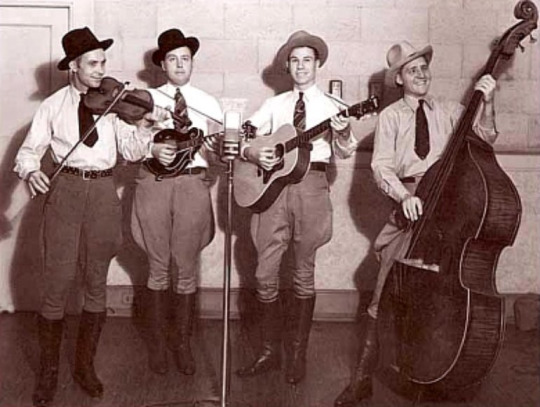
This is something Bill Monroe bragged about even as the decades went on. For Monroe, it was important to dress well and in dignity when you got onstage. You respect yourself and you respect audiences when you come out in your best.
By the mid-1940s Bill Monroe’s band had accumulated a number of musical features that today our ears would recognize as bluegrass. It’s interesting to notice that bandmembers who left Monroe and went on to do their own bluegrass music often... took with them some of Bill’s ideas about stage presentation. Flatt & Scruggs, when they left Monroe and started their own band, are sometimes seen in early images wearing jodhpurs.
Early bluegrass bands on occasion might have had an “exception” to the rule. At the very least, you see this in Flatt & Scruggs in the late 1940s and first half of the 1950s. But I believe what they were doing reflected a trend that existed in the broader hillbilly music industry. I’d like investigate that more later to understand better. Unlike today’s concerts that involve music and only music, in those times, comedy was a more expected part of a show. White banjo performers, prior to bluegrass, were essentially all comedians; and in ensembles, someone (as I’ve often seen, the bass player) might take a comedy role. So you could’ve gotten a well-dressed band... and then the bassist dressed in comic rube garb.
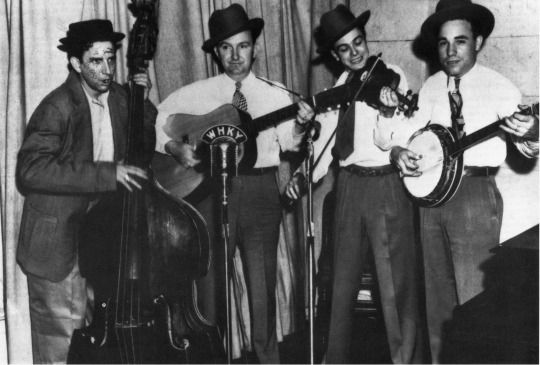
That said, each first generation bluegrass band ended up creating their own unique presentation. It’s variation around a theme: dress up nice to respect audiences and put your best foot forward. How you present yourself onstage has impact. Audiences aren’t coming out to see some tattered everyday person; they’re coming out here to listen to music stars.
And so you see bands and acts coordinating their outfits in classy ways like...
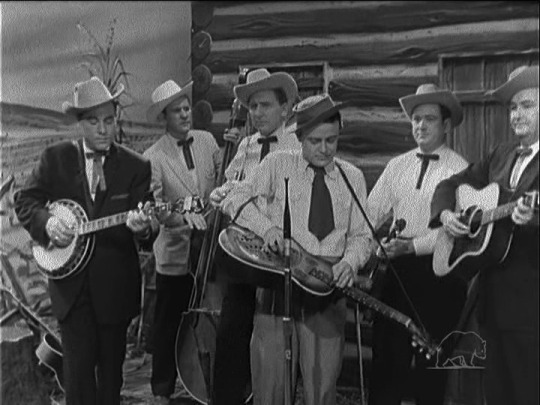
(The 1958 screencap above doesn’t 100% evoke this, but I’ve noticed Flatt & Scruggs in the mid-50s through mid-60s would often do a 2-2-2 coordination. Everyone would wear hats. The band leaders would wear matching jackets and string ties. Two band members would wear the same collared shirts and the same string ties as the leaders. The last two band members, who were a duet and comedy team, would wear vests or different hats or some other distinguishing marker. Everyone’s clothes would carry the same overall color theme. Very well-thought out wardrobe presentation.)
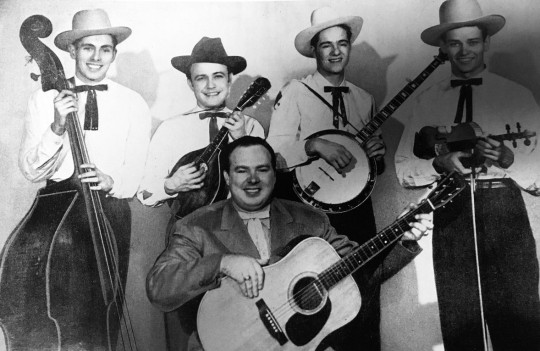


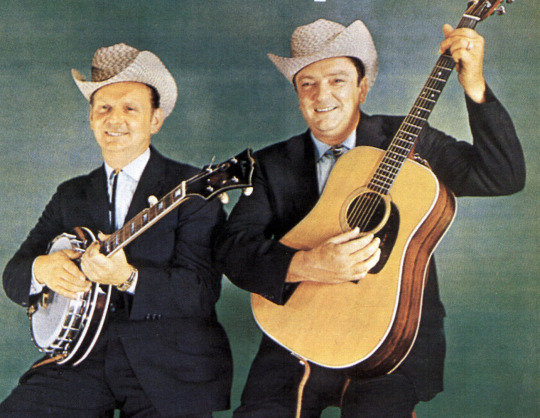

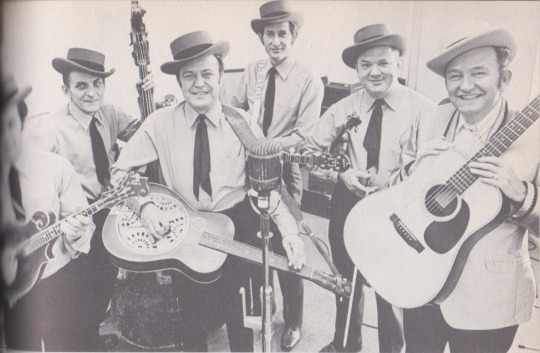
SEE? EVERYONE IS DRESSED UP AND LOOKS GOOD.
You can tell they’re an act. You can tell they’re professional. You can tell, the second they step up to perform, they mean business. It helps elevate them into STARS.
As new generations took up bluegrass, the social context of how to dress changed. The Folk Revival of the 1960s brought many Northerners, urban people, and hippies into the bluegrass world. I haven’t read up as much on this part of bluegrass history, but I believe it was starting here that new bluegrass ensembles quit thinking about dressing up to be onstage. I’ve certainly seen photos of the early bluegrass festivals of the late 60s and 70s, and some second generation bluegrass groups would wear extremely casual things onstage. Other groups would coordinate by wearing the same collared shirt, which meant they were matching, but also (to me) making less of a “statement.”
It makes sense. First generation bluegrass performers were seeking to dress to impress and get away from crappy hillbilly stereotypes. Later generations of bluegrass performers might not have been from the South or a country lifestyle at all, and would feel more inclined to try to evoke a “working class” vibe by wearing everyday or ragged clothing. Today, I feel many bands do this to evoke their own form of an authentic stage presentation.
This means that today, many groups wear rather casual clothing. I feel I see this especially in jamgrass. And for the record, these are all VERY talented, well-known ensembles; I’m not comparing pros to locals or something.
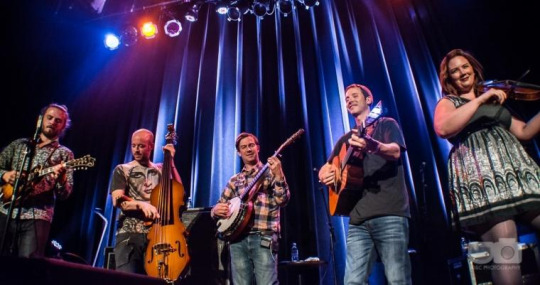
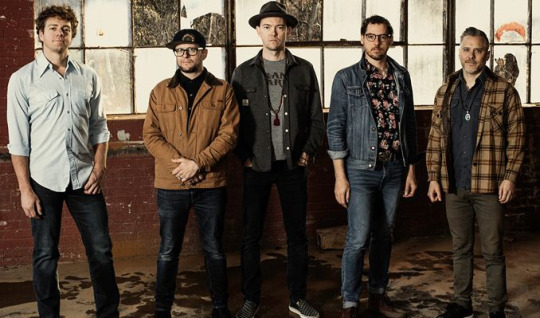
And they’re dressed better here than what I’ve seen for bands at concerts.
I think it’s ironic that Bill Monroe, the Father of Bluegrass, sought to escape tattered clothing that actual country people wouldn’t wear on the fields, let alone onstage... only to have bluegrass musicians half a century later revert to costuming concepts Monroe had rejected. Today’s clothes of course aren’t the torn-up straw hat and single-strapped overalls of the early Opry, but it’s the same idea: dress down to look “country.” I don’t think there’s any objective disrespect to bluegrass’s history to dress like that, but I do think there’s a point that everyday clothes don’t make as much of an impression for your band.
Now of course not all groups have gone this route. In any generation of bluegrass, you still see bands that dressed more “traditionally.” But it’s certainly been a trend—since at least the 70s—to see bluegrass groups, either at the local or professional level, wearing everyday clothes. Get jeans, maybe some flannel, and you’re good to go. I see it oh-so-often now.
It doesn’t resonate as much to me. I get the point of their presentation, trying to evoke a casual non-mainstream working class image, but I feel there’s other ways you can set a vibe for your ensemble that doesn’t come off as lazy, everyday, or unnoticeable.
I’d be much more interested seeing:

YEAH!!!!! YOU GO RHONDA VINCENT AND THE RAGE!
I think it’s interesting to see this mindset about proper bluegrass performance attire recur in interviews. I’ve watched a number of 2000s and 2010s interviews for first and early second generation bluegrass performers, and one common thing the old-timers complain about is how people don’t dress up anymore. They feel it doesn’t respect the audience or make a good impression for the ensemble. How you present yourself onstage is half of the performance; it can be an effective means of enhancing a show when you do it well.
And I’ve seen it in conversations with people like Steve Martin, showing how in the 2010s, there’s still negative “hillbilly” images to butt against:
INTERVIEWER: Does it bother you that quite possibly the most famous banjo song in pop culture is "Dueling Banjos" from "Deliverance"?
MARTIN: It doesn't bother me at all. Actually I might argue with that because another most famous song would be the theme from "The Beverly Hillbillies" or "Foggy Mountain Breakdown," the song from "Bonnie and Clyde." So there are a couple of 'most famous' banjo songs.
INTERVIEWER: But still… the theme song from "The Beverly Hillbillies"?
MARTIN: It's just something we have to face. And everything changes. That's why I always wear a suit and tie when I play bluegrass.
INTERVIEWER: Do you feel like you're helping changing the face of bluegrass?
MARTIN: I don't know. That's what I do when I go on stage. I don't make hillbilly jokes or things like that. I'm just playing it as the person I am, not pretending to be anything else. The band I play with, we all dress in suits and ties.
One of my favorite contemporary bands also has one of my favorite wardrobes. What they choose to wear is a huge element of their stage presentation, amplifies their show powerfully, and contributes to the entire vibe of their music product. Good costuming can be part of marketing, and they market themselves spectacularly.
The Dead South almost marries the best of both worlds between “dress up” and “dress as the everyday man.” Their clothes aren’t “formal” in the sense of suits and ties. There’s more casualness to it. At the same time, what they wear—blatantly Southern and Western gear that matches with variation across the band—isn’t something everyday Joe or Janet would put on to go to Walmart. It’s got a little more of a “period” feel to it while also being modern enough to feel authentic. Altogether, it makes them classy without being formally classy.
It’s perfect for them. This is a “controversially” bluegrass band who knows that, while they play string band music, its creative reach extends beyond what you’d expect of something labeled “bluegrass.” They have called themselves “a rock band without a drummer, a bluegrass band without a fiddler.” Elsewhere, they’ve marketed themselves as “a gold rush vibing four-piece acoustic set from Saskatchewan [that] infuse[s] the genre's traditional trappings with an air of frontier recklessness, whiskey breakfasts and grizzled tin-pan showmanship.” This is a band I’ve always said plays to a “degenerate” image, songs filled with cowboy shootouts, barfights, gun-wielding robberies, alcoholic nights, and more.
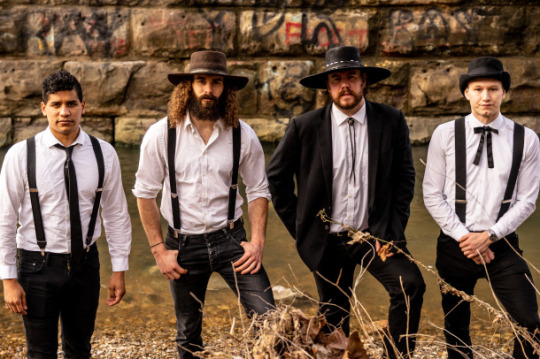
And doesn’t their wardrobe evoke that spotlessly? There is CLASS and INTENTION with how they present themselves, to the point the band almost always stands in that order left-to-right, and has used their unique wardrobe choices for album covers and stage design.
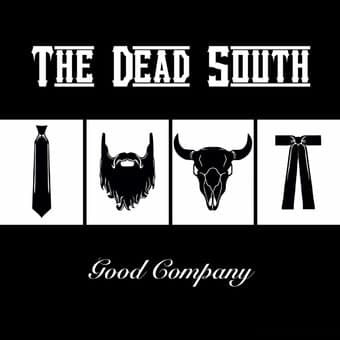
Check out how the stage’s stained glass window lights behind them evoke both images from their songs, and have the tie, beard, skull, string tie theme on them. Every band member stands in front of his respective window.

That is *WAY* cooler, more effective, more impacting, more resonating, more memorable, more vibing, than simply tossing on my latest t-shirt.
(And yes, the last photos are from when I went to their concert last year. One of the best concerts I’ve EVER been to, and it’s because they knew how to put on a SHOW.)
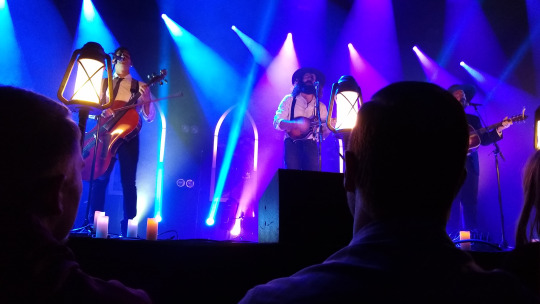
Performance entails everything from the sounds you make to the personality you evoke to the clothes you wear. It’s why I prefer the first generation bluegrass bands’ approach to “dress well” over some modern string band trends. And again, bands like The Dead South show alternate ways you can dress up and rock out.
#long post#that banjo business#thatbanjobusiness#Country Music History#Haddock Deep Dives#General Banjo Business#The Dead South#Bill Monroe#daddy boi billiam#Flatt & Scruggs#bluegrass#first gen bluegrass
27 notes
·
View notes
Text
What propaganda means to weird kids:
I've been meaning to post this for a while, but after a recent spat I had on my main blog I think now's the right time to make it.
I can't speak for everyone about the effects of propaganda, but here's my perspective on some of the most egregious examples I've heard in recent times.
So firstly- I hear a lot of complaints that MCU stuff is military propaganda. Which is true. Does it work? Certainly not to me. While many people have pointed out that the writers counteract this by having Captain America go against the government in all his films, I also agree with the point that their inability to portray the US Government as a full villain cost them a lot of Winter Soldier's plot. Going from "Cap has an interesting debate about freedom vs security with the government he works for" to "Oh, everyone who disagreed with Cap turned out to be a Neo-Nazi so he's right by default." is why that movie is one of my less favorites of the MCU.
Since I don't really watch American TV these days I never saw any of those cringey "The Air Force are the true heroes, like Captain Marvel!" ads, which yeah, are a bit ouch. Nevertheless, I don't really see the appeal Marvel is meant to create with its military propaganda if all the things that are the "coolest" about the US Army in the MCU don't actually exist? Per se, if I join the army, do I get a Stark tech Falcon suit? Do I get supercharged with Tesseract energy? No? Then what reason do I have to join? Because without that, all there is is sitting in the hot desert with a dusty rifle being bored and murdered, and there's nothing fun about that. And honestly, compare the MCU films to the hyper-macho military tech festival that are Michael Bay movies and you can see the difference between using a military setting as a backdrop vs glorifying every single thing the army does.
I think the only marvel series that's kind of guilty of true negative propaganda have been the Iron Man movies. The first one came out during 2008 and was itching to show the Middle East being blown up, and showing as many minorities as possible being a part of the ten rings. And since Iron Man main villains have always been uncomfy xenophobic caricatures because of the whole "arms race" theme, that's what they sadly followed for all the other Iron Man films. Just a ton of "That guy has tan skin and a funny accent, even if he's white so he has to be bad" exists in those films so it's kind of a shame.
On a more lighthearted note, similar points have been raised about how the Contests and Performances in Pokemon are propaganda for toxic idol culture. And just like before, if you're actually a Pokemon fan, why would you join an industry that doesn't let you hang out with real life Pokemon like the "propaganda" said you would? The Contest and Performance industry in the anime has been shown to be unfair, stressful, and physically intensive anyways. It seems to me that the only people these kinds of propaganda would affect are fake fans who would fall for other stuff anyways.
Personally, I think the worst propaganda isn't something occupational-based or political, because those things don't come up toooo often in kids shows. One of the worse subliminal influences I see consistently in shows for all ages is "Main Character Privilege". Where the protagonist is uncool and gets bullied, so the bullies are the bad guys, BUT- the protagonist also has "even more uncool" friends and side characters and bullying them is totally fine because they deserve it. It happens in stuff like Fairly OddParents, nearly every Disney sitcom, and TONS of anime series (that people ignore because the twink protagonist is hot so it's only unfair that he gets bullied and not everyone else) It creates the mindset in the audience that if they are bullied, they can only be the victim and the "good guy", and that anything bad they do to other people doesn't count.
Do you think I'm right or wrong? Let me know!
someday I wanna use passive-aggressive tumblr talk like "sorry I don't make the rules" or "If you disagree I will happily block you" or something just as a joke to disappoint people because I think I speak pretty normally on here for the most part
4 notes
·
View notes
Note
I know you're not happy with the show but making things up is really damaging your reputation. The show is not a failure; it's the biggest launch of any disney+ show so far with the highest ratings. The first trailer has so many views because it's 7 months old, compared to the first episode being out a week and a half. The CGI doesn't look like it was done by a two year old (seriously lmao??). The tesseract looks dull because it powers down once in the TVA. Stop pretending Loki was mind controlled when Marvel confirmed in his character bio that he was emotionally influenced by the scepter. Bucky was mind controlled. Selvig and Hawkeye were mind controlled. Loki was influenced like Banner and the others were by the sceptre when they were around it on the helicarrier. Please consider that care has been taken to make Loki more multifaceted in this show, not OOC - he's just got more emotion and character to him now and feels to me and a lot of others, more like a living, breathing person who is struggling in the immediate aftermath of being shown the most traumatic recap of his life. I'm really sorry you're not happy with him, but his emotional core and inner heartbreak is being treated with love and respect by the show.
Hahahahahahahahhaha oh my god anon this was a funny read. Ngl usually when ppl come clowning in my inbox with incoherent rants I just delete it. But this was some quality clowning. This was just too funny to not share with everyone. So I’m gonna go line by line here.
“I know you're not happy with the show but making things up is really damaging your reputation.”
I’m gonna be real with you anon. This makes me sad because I will never write anything this funny. This made me laugh out loud. My reputation? My reputation?!?! I run a blog on Tumblr dot com. No reputation can recover from that. Also as to making things up? Uh. Where??? Just because you don’t like what I have to say doesn’t mean it’s made up. However with that kind of attitude I think you have a bright future ahead of you working in PR for the GOP. They love people who talk like you.
“The show is not a failure; it's the biggest launch of any disney+ show so far with the highest ratings.”
Ok I literally just talked about that HERE. But let me add a few more points here for your convenience. First of all, Disney+ hasn’t actually been doing that great. In fact Disney’s stock recently fell precisely because Diseny+ has underperformed. It missed growth expectations and none of the shows have attracted that big of an audience. Loki had MASSIVELY more interest than either WandaVision or TFATWS and yet it only drew 890K households for the premier - just barely more than either of those shows got. There haven’t been any numbers released for the episodes after the premier but given how boring and unfunny and uninteresting the premier was, I wouldn’t be surprised if a lot of viewers, especially more casual ones, didn’t come back for more.
“The first trailer has so many views because it's 7 months old, compared to the first episode being out a week and a half.”
Incorrect. Trailers get most of their views in the first week, and the vast majority in the first 2 weeks. Indeed, they get the most engagement in the first DAY usually and then it starts slowing. The early trailer that got 18 million views got most of that very quickly and then has grown extremely slowly ever since. The more recent trailers are not tracking to get anywhere near than engagement. Why? Because interest is dropping. Now maybe people just aren’t as interested in the trailers because they’re just happy to watch the actual show now or because they loved the first trailers so much that they decided to watch the show just based on that and didn't want to spoil themselves watching later trailers. Who knows. I certainly have my theories though.
"The CGI doesn't look like it was done by a two year old (seriously lmao??)."
Actually I said the posters looked like they were done by a 2 year old. Most of the CGI looks like cheap made-for-tv effects done by an underpaid and under qualified adult. But go off I guess. Also don’t even try to defend those badly photoshopped posters to me. I have eyes. I could argue with you but a picture is worth a thousand words. And just. Look at this thing! This is real. It’s so bad but it’s real. Who wants this?
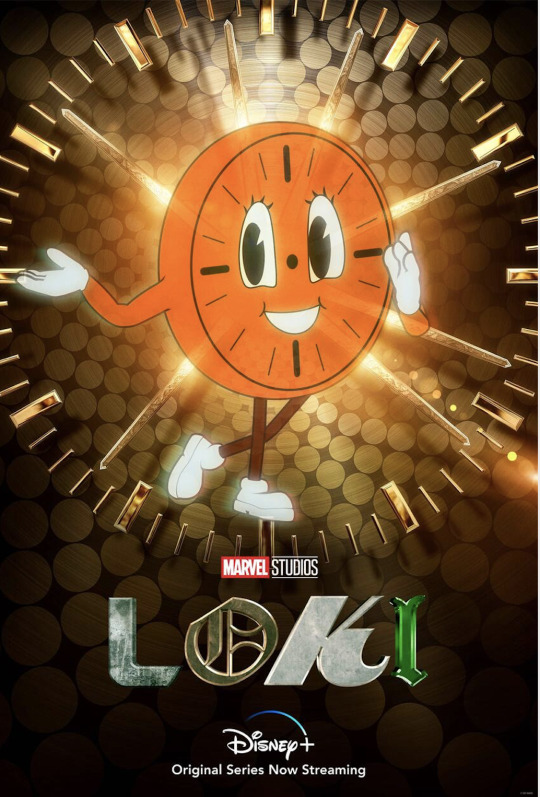
"Stop pretending Loki was mind controlled when Marvel confirmed in his character bio that he was emotionally influenced by the scepter.Bucky was mind controlled. Selvig and Hawkeye were mind controlled. Loki was influenced like Banner and the others were by the sceptre when they were around it on the helicarrier"
That’s mind control lmao. The scepter was magically influencing his mind. Do you think emotions come from our feet or something?! (And that’s not even getting into the torture and conditioning he underwent or the fact that the Other had his claws in Loki’s mind and was hurting and threatening him in addition to the mind control). Also why do you think it’s appropriate to come on my blog like this and make these sorts of demands? This is my fandom blog that I run for fun. I can engage however I want. You need to learn to cope with that. If you enjoy the show that’s great. Go enjoy it. Don’t tell other people what to think. That’s not appropriate, reasonable, or healthy. If you find yourself truly unable to cope with strangers having different opinions from you about a tv show based on a comic book I definitely suggest you seek help from a professional.
"Please consider that care has been taken to make Loki more multifaceted in this show, not OOC - he's just got more emotion and character to him now and feels to me and a lot of others, more like a living, breathing person who is struggling in the immediate aftermath of being shown the most traumatic recap of his life."
I don’t see any evidence at all of care being put into the show. The writing and storytelling is incredibly sloppy. It gets even the most basic things wrong - like Loki’s speaking style or the fact that he wasn’t young in the 70s or that he speaks the Allspeak not English or his skin tone or hair length or the fact that Jotun!Loki should’ve had ridges on his skin. The head writer and story creator also is openly disdainful of Loki and talks about how he’s a “shithead” and “proper and pompous” and how he needs to be put in a situation where he has to stop “blaming” Odin and Thor for all his problems. He shows no understanding of Loki’s character or care for it. Maybe care was put into the show and they just messed up but I don’t see evidence of that. There’s certainly no way you could know that for a fact unless you are involved in the production in which case you are a biased source who has an ulterior motive for silencing critics of the show.
Also TV!Loki doesn’t feel like a real person to me at all. He feels like a caricature. He doesn’t act like Loki or do or say the things he would or even stand like he would. Look how Loki behaved when being interrogated by Natasha or when being berated by Odin. Loki is someone who puts on a performance as a sword and a shield. TV!Loki is a stupid clown.
"I'm really sorry you're not happy with him, but his emotional core and inner heartbreak is being treated with love and respect by the show."
No it’s not. It’s being turned into a punchline. The “humor” in the show derives entirely from invalidating Loki’s feelings and retconning his motivations and humiliating and mocking and denigrating him and turning him into a literal punching bag. The show robs the character of all dignity and seriousness and makes a mockery of him and the fans he meant so much to. And for what? The humor isn’t even funny.
41 notes
·
View notes
Text
Yes, God, Yes
Full disclosure: I not only attended a Catholic high school, but I specifically attended a Kairos retreat, the exact retreat which the characters from 2020’s Yes, God, Yes attend. In the film, they call it “Kirkos,” but everything about “Kirkos” is the same as my (and seemingly every) Kairos. So let me clear up a few things for those of you who saw this film and thought, “This shit at this movie retreat can’t be what they do in real life.” Yes, Kairos leaders really do collect your phone and watch upon arrival to the retreat center since you are now on “God’s time ”(kairos comes from the Greek word καιρός which literally means “God’s time”). Yes, you are forced into small groups with your other classmates and feel this weird pressure to have a sad life story to share. Yes, small group leaders start to play music while they tell their own story AND pass out the lyrics as if these song lyrics are real deep poetry. One of my retreat leaders, for example, handed out sheets of the lyrics to Florence + The Machine’s “Shake it Off.” Now, I LIKE Florence + The Machine, but even still the lyrics to that song are nothing special. And, most of all, yes, those who come back from Kairos do tend to act a little cultish. At our school it was referred to as having a “Kai high,” a feeling in time when everyone just wants to be friends yet those people only exclusively hang out with one another.
In defense of Kairos retreats, at their very best, they offer adolescents at a critical time in their development the opportunity to reflect on their lives thus far, evaluate if they are living out the values their parents and community have instilled in them, and give them a safe space to work through conflicts, apologize, and try to be better people. At their worst, it’s a self-congratulatory experience where people act morally superior to others without really doing anything substantial… or even worse it’s a period of time where adolescents might unearth and talk about really hard topics like suicide, depression, etc. for the first time… and yet are given no real guidance on how to handle those emotions outside of this four day experience!
All this said, this is not a review of Kairos retreat. It is, indeed, a film review. I just wanted to make clear my biases etc. before talking about it since the retreat does more than provide the setting for the majority of Yes, God, Yes: the retreat’s four-day thematic structure doubles as the film’s plot structure. Just as in real life, our protagonist does a lot of questioning about her life and her faith during her first day, does some “crying” during the second as people, “accepting/trusting” the third, and then “living out” the lessons she learned on the fourth day and beyond! The difference is that in real life, teens are supposed to do these things in regard to their faith... or protagonist across those four days has a genuine sexual awakening.
In fact it’s exactly the desire to suppress her sexuality that prompts our protagonist to go on the retreat in the first place. Because our protagonist, Alice (played by Stranger Things’ Natalia Dyer), has just discovered something about herself that is hard to put out of her mind: she likes sex! Or, more specifically, likes masturbating. Alice is, from what we can tell in the prologue, a pretty by-the-books Catholic teen. She follows the rules, goes to Church with her Dad every Sunday, and os pretty sexually naïve… sheltered as we used to describe kids. Someone starts a rumor that Alice “tossed” a boy’s “salad” at a party and the rumor spreads like wildfire. Even the teachers know about it, and she loses her status as a gift bearer for the school’s weekly Mass. Of course, Alice doesn’t even know what “tossing salad” means (nor truthfully did I… but the movie seems to anticipate this by providing a definition to the audience at the very beginning of the film.)
All Alice knows is that she likes arm hair… like LIKES arm hair, something she discovers when she’s on an AOL chat room and someone sends her porn. That’s right, this is a film set in the early ‘00s, so if you hold any nostalgia for that time, get ready to have your fill from the era’s cheesy pop ballads to giant brick phones, to the fact that America (while starting to be so) wasn’t so health conscious that’s it not crazy to believe a teenage girl would just come home from school and snack on frosting and a giant bowl of Cheetoh’s Puffs. The nostalgia is not quite as in your face as in Captain Marvel, but it’s certainly more of a focus than it was in Lady Bird.
Yeah, you knew the comparison was coming. Let’s just be clear, this is by no means trying to be the next Lady Bird. This movie knows it’s pretty frivolous to begin with. Still, it’s hard to avoid comparison with the last big movie about a Catholic girl coming of age in the early 2000s. What I learned in watching this movie compared to Lady Bird or even Boyhood is that merely recreating aspects of my former life does not a good movie make. While I loved the fact that part of watching Lady Bird was getting to see someone shine a light on how ridiculous high school theater could be, that was never the point of the movie. Here, meanwhile, a significant purpose of the film is to highlight the fact that, yes, Kairos retreats are weird and the Church sucks. While I found myself nodding my head in agreement with what I was seeing on screen… it wasn’t exactly enjoyment as much as thinking, “yup, this is what a Kairos retreat is.” Furthermore, I feel like there are aspects of Kairos that would be great for skewering and I love the parts they absolutely nail: the cultish nature of the retreat and the pressure to frame your life in a sad way… but they ultimately take a route of criticism that is too easy and frankly is not a focus of most Kairos retreats… the focus on shaming one’s sexuality and the innate hypocrisy that behavior inevitably reveals.
If there’s a villain in this film, it’s probably the retreat leader and school priest Fr. Murphy (Timothy Simons), who gives in to rumors of Alice’s sexual impropriety as much as any schoolyard bully. No one in this whole film, from Fr. Murphy, to the head of Alice’s bunkhouse, to her small group leader, to even her best friend, takes Alice’s spiritual journey seriously, as they all assume Alice is not taking the retreat seriously as she seems to be avoiding talking about her recent, rumorous activity. Of course, there’s a bit of #MeToo hypocrisy here in that the male with whom Alice is said to have been engaged with enjoys none of the backlash that she has been dealing with. And to that degree it’s a satisfying movie in that Alice gets to dish out a little #MeToo revenge.
Still, even with all things conspiring against her, Alice retains her good spirit throughout the film… as well as her determination to further explore her sexuality. On the one hand, it’s a little unrealistic the risks she takes in trying to learn more about her body, but on the other hand teenagers and young adults are friggin’ weird when it comes to figuring out themselves. Ultimately she is emboldened in this take once she finds out that all those people who are out to get her to confess her “sins” are sinners in much the same way.
Probably the best scene comes at the end of Alice’s third day of the retreat when she runs away from the retreat center and walks into a lesbian bar where she hears the story of someone who used to be Catholic and is now not. More important than anything she could learn at the retreat, this Iowa girl learns that some normal people… just don’t have a religion. For some people this world, its pleasures, its pains, is more than enough. Alice doesn’t become a full-blown hedonist after this, but she is opened up to realize there’s more to life than Catholic guilt.
Perhaps to make this good message ring out, the film as a whole, despite some absurdist elements, feels like it’s meant to be a somewhat accurate reflection of reality. I wish the writer/director, Karen Maine had tried for a slightly more absurdist approach or taken out the absurdity altogether. She already makes the Catholic high school authority more caricature than character, and the plot at timesis almost silly. Therefore, the tone of the movie just sorta feels off throughout. Just about the only thing keeping this movie grounded is a great performance by Dyer who portrays a genuine sexual awakening very faithfully, capturing the mix of confusion, guilt, and excitement all at once. Even when Alice does something downright stupid, Dyer’s performance engenders our trust from the start, and we are always on her side. I wish I could have liked this movie more as it really does accurately portray some aspects of a Kairos retreat and is about as close as I think I’ll get to having it portrayed in a major film, but ultimately by not treating the Church authority with the same amount of nuance paid to Dyer’s Alice and her sexual awakening, the film ends up being an enjoyable, if one-noted, experience. Come to make fun of Catholics, stay for Dyer’s performance.
**7/8 (Two and seven-eighths out of four stars)
8 notes
·
View notes
Text
The Big Nose in the room
----
Be it hooked, long, snarled, or just pointy...I love em! I’m sure you guys can tell when you look at my character designs.
I love them for the same reason LOTS of cartoonists love them: they’re this supposed “imperfection” that just SCREAMS character. Once thought to be a nasty trait that made villain characters uglier, big long schnozes are now seen as an endearing feature to many a cartoon; good, bad or in between. I sorta wish the same could be said with people who have actual big, elongated noses irl, but still! THEY’RE JUST SO WHOLESEOME.
And, they almost certainly have origins in antisemitic caricatures.
oh
---
Over on my Oddities blog I WILL be addressing the future of my witch designs - which, like so many others, were def not designed out of any sort of malice - and this will extend to my other works...
For now though, just know that I am deeply conflicted about what to do or how to feel.
NOT that my anxiety is in any way comparable to the billions of Jewish people who’ve had to deal with this for as long as we’ve had printed paper. You are the real victims and I want you all to know that seeing how so many artists throw hissyfits at the mere suggestion that they’re drawings come from something problematic.
((Also, yes, not all large/hooked/beaked noses are harkening back to propaganda. Please try and reference this in support of these designs and not because you want to snuff out the light in this convo. Like, come on, I have eyes Roald Dahl!))
But for the big-nosed characters in media that are certainly the end result of these antisemitic designs, IT’S SO HARD TO UNLEARN. They’re literally EVERYWHERE. It’s one thing to say “okay, no more reptilians! I loved them once but now I know David Icke made them as a modern ‘ICan’tBelieveIt’sNotAntiSemitism’, I won’t be drawing or writing bout them” Totally fair.
It’s another thing to unlearn what literally looks appealing and/or harmless to you as an artist. I’ll be honest, I don’t know what to do in the case of all of my OCs. If I were Jewish, that’d be different as I would see this as a chance to reappropriate this stuff kind of stuff away from hate. But I’m not. It’s like with the attempts to redesign Zwarte Piet way from the black-face/slave connotations of his original design. That sounds pretty cool, BUT the ones who have the real say in it are the black Europeans who are victimized by these kinds of characters, not me: the white people who perpetuated it in the first place.
---
Jewish-insight much appreciated, ESPECIALLY for reblogs!
Whatever I do, I want actual people to influence my decision. I’m usually bound by what my anxiety tells me and I’m always scared about my work upsetting people (I mean, when it’s NOT SUPPOSED to be upsetting, that is. Ftr, this is why I know I wouldn’t be writing “The Adventures of Spring Heeled Jack and Daughter” myself as it’s supposed to be about a deeply toxic person in a deeply backword time in history - it deserves a more mature and antiquated mindset than the one I’m trying to appeal to now.)
- Franki
7 notes
·
View notes
Link
You know what America needs? More mirrors for princes—the Renaissance genre of advice books directed at statesmen. On the Right, we have many books that identify, and complain about, the problems of modernity and the challenges facing us. Some of those books do offer concrete solutions, but their audience is usually either the educated masses, who cannot themselves translate those solutions into policy, or policymakers who have no actual power, or refuse to use the power they do have. Scott Yenor’s bold new book is directed at those who have the will to actually rule. He lays out what has been done to the modern family, why, and what can and should be done about it, by those who have power, now or in the future. Let’s hope the target audience pays attention.
The Recovery of Family Life instructs future princes in two steps. First, Yenor dissects the venomous ideology of feminism, which seeks to abolish all natural distinctions between the sexes, as well as all social structures that organically arise from those distinctions. Second, he tells how the family regime of a healthy modern society should be structured. By absorbing both lessons and applying them in practice, the wise statesman can, Yenor hopes, accomplish the recovery of family life. (Yenor himself does not compare his book to a mirror for princes; he’s too modest for that. But that’s what it is.)
…
You will note that this is a spicy set of positions for an academic of today to hold. You will therefore not be surprised to learn that Yenor was the target of cancel culture before being a target was cool. He is a professor of political philosophy at Boise State University, and in 2016, in response to Yenor’s publication of two pieces containing, to normal people, anodyne factual statements about men and women, a mob of leftist students tried to defenestrate him. Yenor was “homophobic, transphobic, and misogynistic.” (We can ignore that the first two of those words are mostly content-free propaganda terms designed to blur discourse, though certainly to the extent they do have meaning, that meaning should be celebrated—I would have given Yenor a medal, if I had been in charge of Boise State.) They didn’t manage to get him fired (he has tenure and refused to bend), but the usual baying mob, led by Yenor’s supposed peers, put enormous pressure on him, which could not have been easy. He still teaches there; whether it is fun for him, I do not know, but it certainly hasn’t stopped him promulgating the truth.
…
Yenor begins by examining the intellectual origins of the rolling revolution, found most clearly within twentieth-century feminism. One service Yenor provides is to draw the battle lines clearly. He does this by swimming in the fetid swamps of feminism; I learned a lot I did not know, although none of it was pleasing. He spends a little time discussing so-called first-wave feminism, but much more on second-wave feminists, starting with Simone de Beauvoir, through Betty Friedan, and into Shulamith Firestone, this latter a literally insane harridan who starved herself to death. The common thread among these writers was their baseless claim that women had no inherent meaningful difference from men, and that women could only be happy by the abolition of any perceived difference. This was to lead to self-focused self-actualization resulting in total autonomy, and a woman would know she had achieved this, most often, by making working outside the home the focus of her existence. Friedan was the great popularizer of this destructive message, of course, which I recently attacked at length in my thoughts on her book The Feminine Mystique.
…
After this detailed examination of core feminist ideas, Yenor suffers more, slogging through the thought about autonomy of various two-bit modern con men, notably Ronald Dworkin and John Rawls. He analyzes the dishonest argumentative methods of all the Left, in general and in specific with regard to family topics—false claims mixed with false dichotomies and false comparisons, what he calls the “liberal wringer,” the mechanism by which any argument against the rolling revolution is dishonestly deconstructed and all engagement with it avoided. The lesson for princes, I think, is to not participate in such arguments, and to remember what our enemies long ago learned and put into practice—that power is all.
Yenor describes how the modern Left (which he somewhat confusingly calls “liberalism,” but Rawls and his ilk are not liberal in any meaningful sense of the term, rather they are Left) uses the law to achieve its goal of the “pure relationship,” meaning the aim that all relationships must be ones of free continuous choice, that is, without any supposed repression. This leads to various destructive results when it collides with reality, including the reality of parent-child bonds, and more generally is hugely destructive of social cohesion. From this also flow various deleterious consequences resulting from ending supposed sexual repression; this section is replete with analysis of writings from Michel Foucault to Aldous Huxley, and contains much complexity, but in short revolves around what was once a commonplace—true freedom is not release from constraints, but the freedom to choose rightly, to choose virtue and not to be a slave to passions, and rejection of this truth is the basis of many of our modern problems.
…
Finally, Yenor turns to what should be done, which is the most noteworthy part of the book. As he says, “Intellectuals who defend the family rightly spend much time exposing blind spots in the contemporary ideology. All this time spent in the defensive crouch, however, distracts them from thinking through where these limits [i.e., the limits Yenor has just outlined in detail] point in our particular time and place. Seeing the goodness in those limits, it is necessary also to reconstruct a public opinion and a public policy that appreciates those limits.” Thus, Yenor strives to show what a “better family policy” would be.
This is an admirable effort, but I fear it is caught on the horns of a dilemma. The rolling revolution does not permit any stopping or slowing; much less does it permit any retrenchment or reversal. Our enemies don’t care what we think a better family policy would be. And if we were to gain the power to implement a better family policy, by first smashing their power, there is no reason for it to be as modest as that Yenor outlines—rather, it should be radical, an utter unwinding of the nasty web they have woven, and the creation of a new thing. Not a restoration, precisely, but a new thing for our time, informed by the timeless Old Wisdom that Yenor extols. The defect in Yenor’s thought, or at least in his writing, is refusing to acknowledge it is only power that matters for the topics about which he cares most. But presumably the future princes at whom this book is aimed will know this in their bones.
Yenor himself doesn’t exactly exude optimism. Nor does he exude pessimism, but he begins by telling us that “we are still only in the infancy” of the rolling revolution. This seems wrong to me; in the modern age, time is compressed, and fifty years is plenty of time for the rolling revolution, a set of ideologies based on the denial of reality, to reach its inevitable senescence, when reality reasserts itself with vigor. This is particularly true since every new front opened by the revolution is more anti-reality, more destructive, and more revolting to normal people, who eventually will have had enough, and the sooner, if given the right leadership.
…
For most purposes, what Yenor advocates would be a restoration of family policy, both in law and society, as it existed in America in the mid-twentieth century. I’m not sure that’s going back far enough for ideas. You’re not supposed to say it out loud, and Yenor doesn’t, but it’s not at all clear to me that even first-wave feminism had any virtue at all. To the extent it is substantively discussed today, we are given a caricature, where the views of those opposed to Mary Wollstonecraft or John Stuart Mill are not told to us, rather distorted polemics of those authors about their opponents are presented as accurate depictions, which is unlikely, and even those depictions are never engaged with. But we know that most of what Mill said about politics in general was self-dealing lies that have proven to be enormously destructive, so the presumption should be that what he said about relations between men and women was equally risible.
…
Penultimately, Yenor addresses such new frontiers being sought by the rolling revolution, with the implication that the rolling revolution might, perhaps, be halted. Here he talks about the desire of the Left to have the state separate children from parents, particularly where and because the parents oppose the revolution, but more generally to break the parent-child bond as a threat to unlimited autonomy. He says, optimistically, “No respectable person has (yet) suggested that parents could be turned in for hate speech behind closed doors.” But this has already been proven false; Scotland is on the verge of passing a new blasphemy law, the “Hate Crime and Public Order Law,” and Scotland’s so-called Justice Minister (with the very Scots name of Humza Yousaf) has explicitly noted, and called for, entirely private conversations in the home that were “hate speech” to be prosecuted once the law is passed. A man like that is beyond secular redemption, yet he is also a mainline representative of the rolling revolution. The reality is that discussion does not, and will never work, with these people, only force. Still trying, Yenor presents a balanced picture to his hoped-for audience of princes, such as discussing when state interference in the family makes sense (as in cases of abuse). However, such situations have been adequately addressed in law for hundreds of years; the rolling revolution is not a new type of such balancing, but the Enemy. Discussions about it will not stop it. No general of the rolling revolution will even notice this book, except in that perhaps some myrmidons may be detached from the main host to punish Yenor, or to record his name for future punishment.
Yenor ends with a pithy set of responses to the tedious propagandistic aphorisms of the rolling revolution, such as “Feminism is the radical notion that women are human beings.” And, laying out a clear vision of a renewed society based on the principals he has earlier discussed, he tells us, “In the long term, the goal is to stigmatize the assumptions of the rolling revolution.” No doubt this is true; cauterizing the societal wound where the rolling revolution will have been amputated from our society will be, in part, accomplished by stigmatizing both the ideas and those who clamored for them or led their implementation. How to get to that desirable “long term,” though, when their long term is very clear, and very different from the long term Yenor hopes for? He says “Prudent statesmen must mix our dominant regime with doses of reality.” Yeah, no. Prudent statesmen, the new princes, must entirely overthrow our dominant regime, or not only will not a single one of Yenor’s desired outcomes see the light of day, far worse evils will be imposed on us. Oh, I’m sure Yenor knows this; it’s the necessary conclusion of Yenor’s own discussion of those eagerly desired future evils. He just can’t be as aggressive as me. I’m here to tell you that you should read this book, but amp up the aggression a good eight times—which shouldn’t be a problem, especially if you have children of your own, whose innocence and future these people want to steal.
1 note
·
View note